Weber County investigator Shane Minor had reason to believe Sheree Warren died at the hands of her boyfriend, Cary Hartmann, on the night of Oct. 2, 1985. But Shane had not been able to corner Cary Hartmann into an interview.
Cary initially cooperated with investigators in the Sheree Warren case. That changed after Cary’s arrest and conviction in 1987 on counts of burglary and aggravated sexual assault. Cary’s crimes earned him two 15-years-to-life prison sentences. Once incarcerated, he’d stopped talking to police.
Police suspected Sheree met with violence on the night of her disappearance, but they could not locate her remains. As a result, the investigation had gone cold for nearly a decade before detective Shane Minor picked it up again in 1998.
“I kind of had to start at the beginning,” Shane said in an interview for COLD.
Shane spent the next several years re-interviewing witnesses, compiling reports and evidence and honing in on a single suspect: Cary Hartmann.
A letter to the parole board about Sheree Warren
By 2005, Cary Hartmann was headed before the Utah Board of Pardons and Parole for a hearing. He’d served 18 years on the sexual assault conviction, three more than the 15-year minimum mandatory term required by his sentence. That meant Cary was eligible for release.
Shane Minor realized the members of the board did not know Cary Hartmann remained a suspect in an unsolved, cold case homicide investigation.
“I felt maybe the board should be aware of that,” Shane said.
Days ahead of Cary Hartmann’s parole hearing, Shane sat down and typed out a letter to the Utah Board of Pardons and Parole. The letter summarized the circumstances of Sheree Warren’s disappearance. It also described Cary’s lack of cooperation with investigators since his arrest.
Shane told the parole board about emerging information from witnesses and informants that possibly placed Cary Hartmann and Sheree Warren together on the night of her disappearance.
“Some of this information has been consistent with information known only to a handful of investigators,” Shane wrote.
He concluded the letter to the parole board by saying his investigation would continue, but only at a slow pace.
Cary Hartmann’s parole hearing
Cary Hartmann stood before Kent Jones, a hearing officer for the Utah Board of Pardons and Parole, five days later. They discussed the details of the crimes that sent Cary to prison. Then, Jones blindsided Cary with a question about Sheree Warren.
“I’m a little concerned about that,” Jones said. “I just wonder as to whether or not she’d dead somewhere and you had anything to do with her death or disappearance.”
Cary denied the accusation. He said he had “nothing to do with it.” Cary said he’d assisted investigators early on in the case.
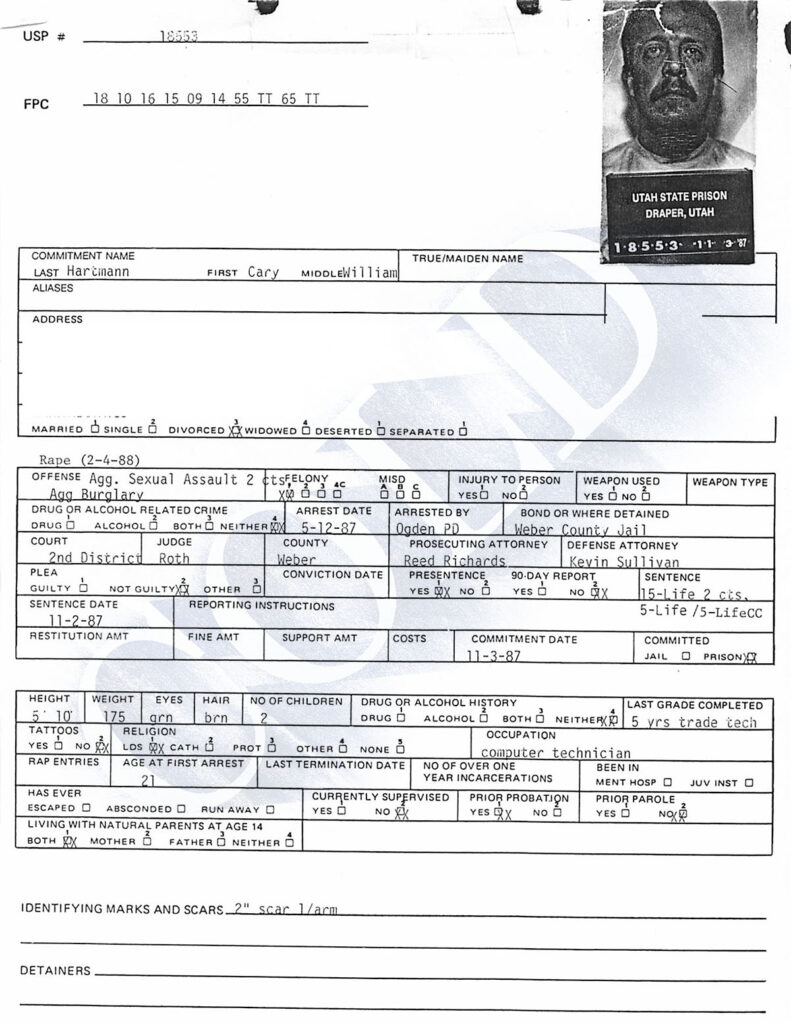
Jones told Cary he did not believe that answer was entirely honest. He said an investigator from Weber County had been in contact with the parole board. The investigator, Jones said, might want to conduct an interview about Sheree Warren.
“I would encourage you to talk to the Weber County people,” Jones told Cary. “I get the information from this investigator that they’ve got a lot more on you than what you think.”
Cary said he would “absolutely” agree to an interview.
Cary Hartmann agrees to talk about Sheree Warren
Investigator Shane Minor and Roy City Police Detective Sergeant Mike Elliott arranged to interview Cary Hartmann on Oct. 26, 2005. Cary was at that time housed in the San Juan County Jail in Monticello, Utah.
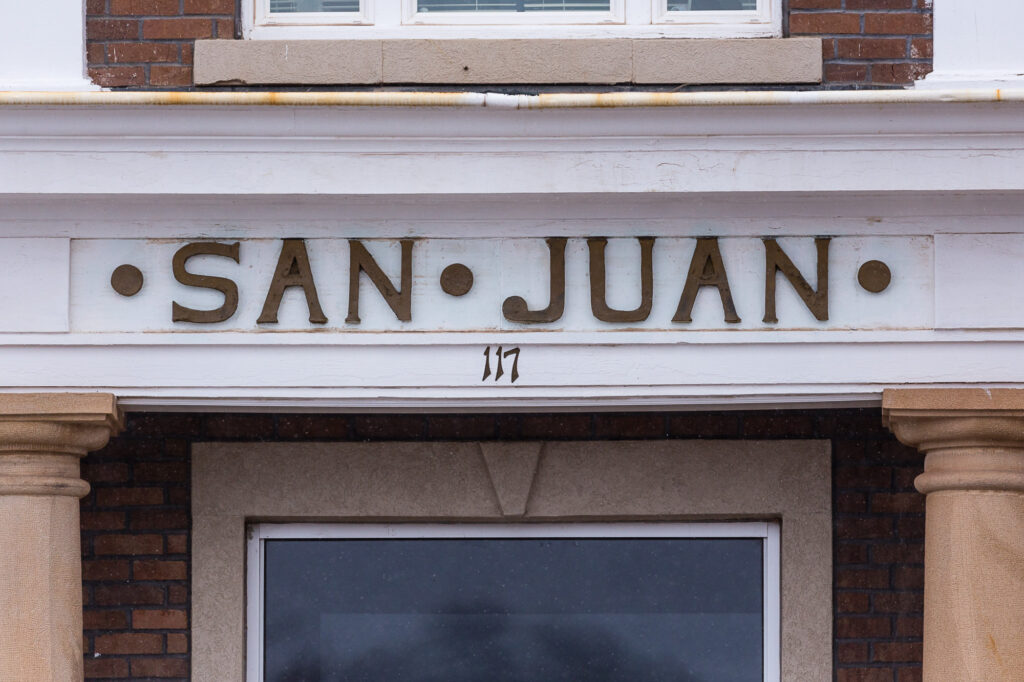
“There was just some basic information that we wanted to get from him,” Shane told COLD.
The Cary Hartmann interview was audio recorded. COLD obtained a copy of that recording through an open records request. A complete transcript of the interview follows below.
Transcript of the Oct. 26, 2005 interview
Shane Minor: Ok, I’m Shane Minor. I’m with Mike Elliott and Cary Hartmann. We’re in Monticello at the San Juan County Jail. Uh, today’s date is October 26, 2005, and it is about 12 o’clock. Ok Cary, I’ve just explained to you that we’ve come down here and we’re here to talk to you about Sheree Warren.
Cary Hartmann: Yes.
Shane Minor: That’s the only thing we’re here to talk about. Uh, you’re in custody. Right now I’m going to give you your rights, ‘cause you don’t have to talk to us unless you want to. So if you just listen to me for just a second. You have the right to remain silent, anything you say can be used against you in court. You have the right to talk to a lawyer for advice before we ask you any questions and to have one with you during any questioning. If you cannot afford a lawyer, one will be appointed for you before any questions if you wish. If you decide to answer questions now without a lawyer present, you’ll still have the right to stop answering at any time. You also have the right to stop answering at any time until you talk to a lawyer. Do you understand each of those rights?
Cary Hartmann: I do.
Shane Minor: Ok, what I’d like you to do is let him read this Waiver of Rights. I would like for you just to read that and if you understand these rights, and everything, just sign here, and we’re going to sign this too, as witnesses.
Cary Hartmann: Ok. (Sound of pen scratches)
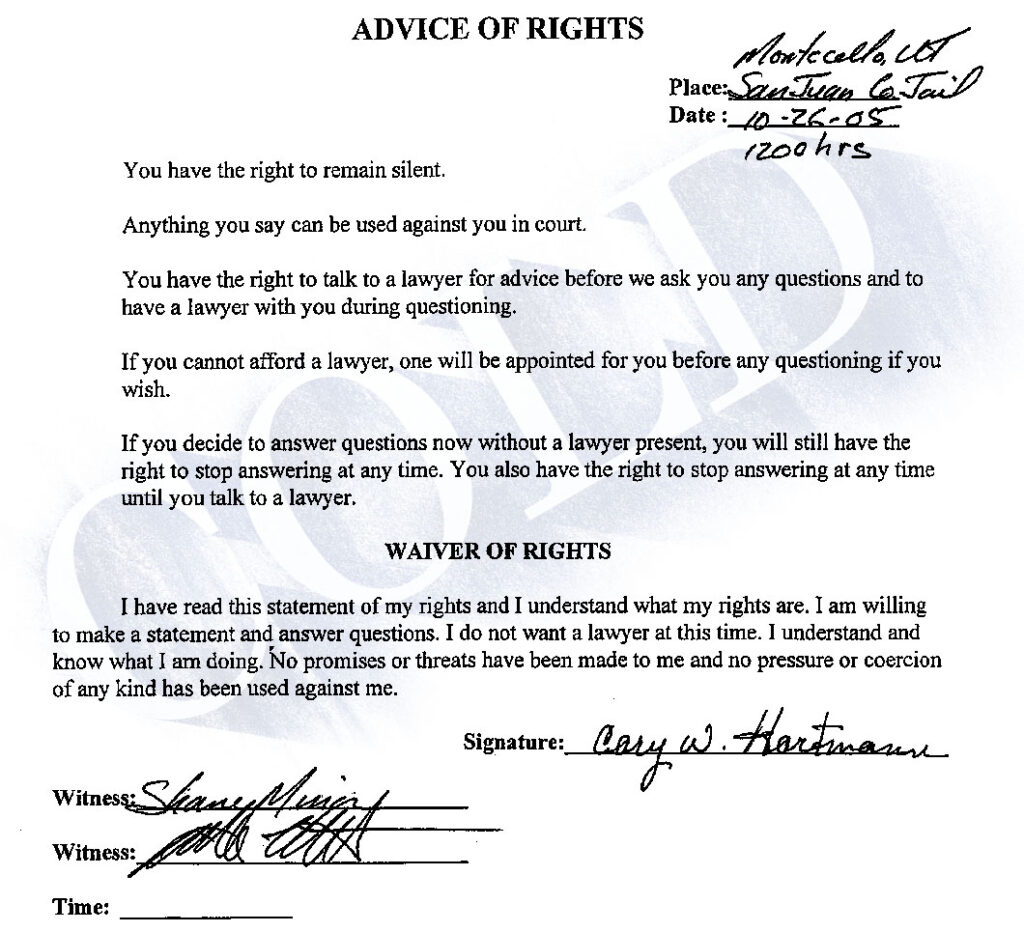
Mike Elliott: It’s about the furtherest corner of the state you can get to with still being in the state.
Cary Hartmann: Well, I started out in Ogden, and I keep moving (unintelligible).
Shane Minor: So you’ve been moved around quite a bit?
Cary Hartmann: Oh boy, my next move I guess is Arizona. And I don’t know—
Mike Elliott: Arizona?
Cary Hartmann: —I’m being facetious.
Mike Elliott: Oh. (Laughs)
Cary Hartmann: I couldn’t get farther from Ogden.
Mike Elliott: Yeah.
Cary Hartmann: So.
Shane Minor: Ok, uh, I guess to start with, what would help us out, and like I’ve explained to you, we’re looking into the Warren case, her disappearance and everything.
Cary Hartmann: So what, you’re lookin’ into old cases, is that it?
Shane Minor: I’m looking into—
Cary Hartmann: Twenty-year anniversary or something?
Shane Minor: No, I’m looking into, we’ve got several unsolved murder cases. You were familiar with Ogden in the early ‘80s. You was a reserve up there. Uh, we have murder cases up there that are still unsolved, have nothing to do with you, ok? But as part of that, part of that group of cases that we’re working this is one of them that’s thrown in ’cause it’s an old case, it’s never been resolved—
Cary Hartmann: An old missing person case.
Shane Minor: —and it’s an old missing person case. This is one of the cases of several others we’re looking into.
Shane Minor: Ok, so this is the only one we’re talking about, and I’m not saying you had anything to do or know anything about the other cases but, there’s other cases we’re looking into, this is just one of them.
Cary Hartmann interview: Cary makes a statement
Cary Hartmann: ‘Kay. I need to, I need to, right at this time, make a statement.
Shane Minor: Ok. Sure.
Cary Hartmann: I absolutely, like I’ve stated a about a hundred times from [Roy police detective] Jack Bell on down, I absolutely did not have anything to do with her disappearance.
Cary Hartmann: Absolutely in no way, shape or form—
Shane Minor: Ok.
Cary Hartmann: —did I, do I have any knowledge of her disappearance, up until surrounding the case, and I helped Jack as much as I possibly could, as a civilian, every single day for a year and a half to look for her. So, I have knowledge of that, but I do not have anything to do with this case.
Shane Minor: Ok.
Cary Hartmann: I just want to state that right now up front.
Shane Minor: That’s fine.
Cary Hartmann: But I’m willing to help in any way I can—
Shane Minor: Well—
Cary Hartmann: —and answer anything that—
Shane Minor: —like I said—
Cary Hartmann: —I possibly can.
Shane Minor: —there’s two reasons, two things that we’d like to talk to you about. One is, to gather whatever information we can from you that might help—
Cary Hartmann: Sure.
Shane Minor: —because you were her boyfriend at that time.
Cary Hartmann: Absolutely.
Shane Minor: And another time is, there’s gonna be a time I’m going to ask you some direct questions—
Cary Hartmann: Ok.
Shane Minor: —just because no one has asked you those questions.
Cary Hartmann: Ok.
Shane Minor: And, uh, if you agreed to talk to us, I was committed to, I’m going to ask you the questions.
Cary Hartmann: Ok.
Shane Minor: I won’t know the answer ’til we ask you.
Cary Hartmann: Alright.
Shane Minor: Ok, so that’s how this is going to work.
Cary Hartmann: Ok.
Cary Hartmann interview: Relationship background
Shane Minor: To start with, if you could give me a little bit of background about you and Sheree, you were her boyfriend—
Cary Hartmann: Right.
Shane Minor: —and do you recall that period of time? I know it’s been a long time—
Cary Hartmann: Pretty much.
Shane Minor: —but that’s something that usually sticks in a person’s mind, like, something like that happens—
Cary Hartmann: Right.
Shane Minor: —that type of an event you remember things. Do you still remember that period time and, like the date? Do you remember when she was reported missing, the year or stuff like that?
Cary Hartmann: Uh, now that’s October 2nd or 3rd, 1985.
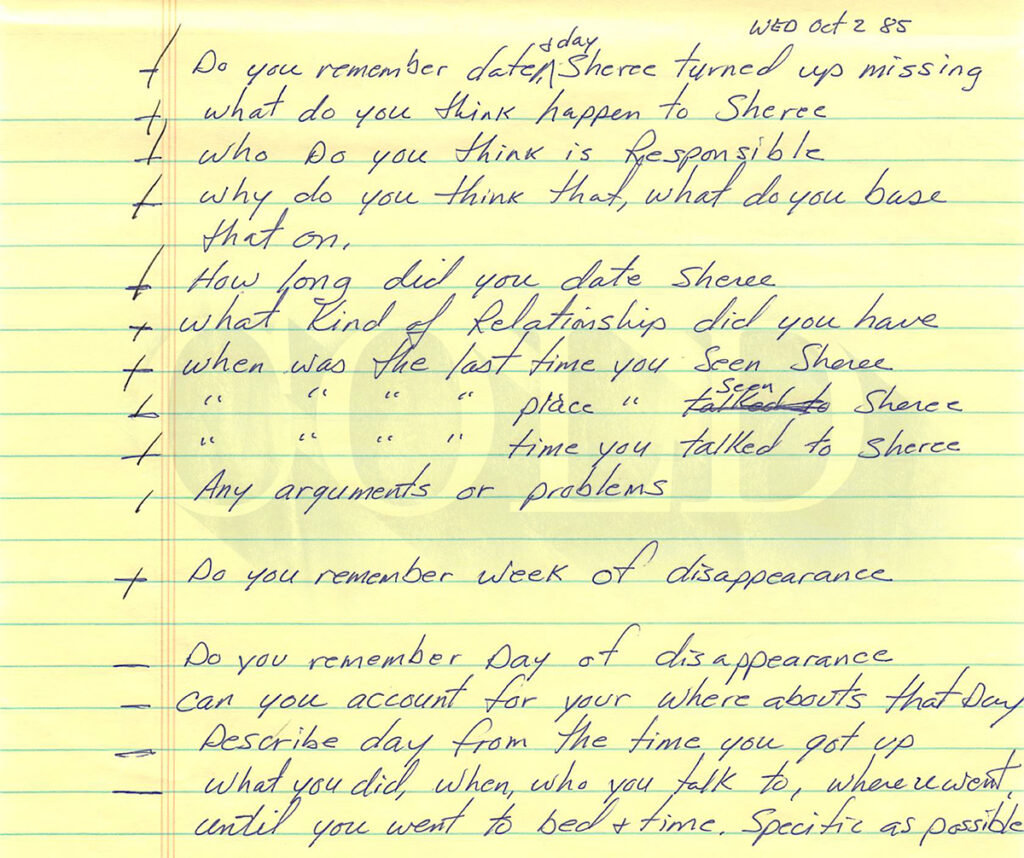
Shane Minor: Ok. Uh, the missing, according to the missing person’s report generated by Jack Bell at Roy City—
Cary Hartmann: Right.
Shane Minor: —uh, she was last seen leaving her work around 6:15 and it’s a Wednesday on October 2nd, ok? At some period of time you had talked to Jack. I know you talked to him a few days later, according to, uh, just a brief synopsis in the missing person’s report. But what I would like to do is, start with, can you describe my relation, your relationship with Sheree at that period of time? Like, how long have you gone out with her? ‘Cause a lot of that stuff I have no idea. I’m trying to find old reports and old information that does not exist.
Cary Hartmann: Uh, we had gone together quite awhile. She was legally separated from her husband.
Shane Minor: She wasn’t divorced yet.
Cary Hartmann: Not quite. This guy was, uh, her ex-husband, he was a piece of work. (Unintelligible)
Shane Minor: Umm, how long? You say quite awhile. Can you remember about how long you went together?
Cary Hartmann: Oh shoot, I’d say, it seems to me we went together about a year.
Shane Minor: Ok.
Cary Hartmann: Yeah, pretty much.
Shane Minor: Alright.
Cary Hartmann: Ok. Uh, we got along fantastic—
Shane Minor: Ok.
Cary Hartmann: —just fantastic. We were in love. We talked about getting married. Never had a harsh word or a cross word between us through the whole time we were going together, not one. Not one argument, not anything whatsoever. It was just a sweet—
Shane Minor: No arguments.
Cary Hartmann: None whatsoever. Umm, even though her place of residence was in Roy with her folks, she had little Adam, a little boy.
Shane Minor: Mmhmm.
Cary Hartmann: She stayed with me and then commuted back and forth to check on her, her young son all the time, like every day, before work and after work and stuff like that, but she slept over at my house a great deal of the time.
Shane Minor: Do you remember how, much when you say a great deal of time, how often would she be over at your house?
Cary Hartmann: Uh, four or five times a week.
Shane Minor: Weekends or during the week?
Cary Hartmann: Both. It wasn’t really a set time.
Shane Minor: Did she have any clothes at your house?
Cary Hartmann: Uh huh. Yeah, she had a few. Overnight things and a few things. A couple changes.
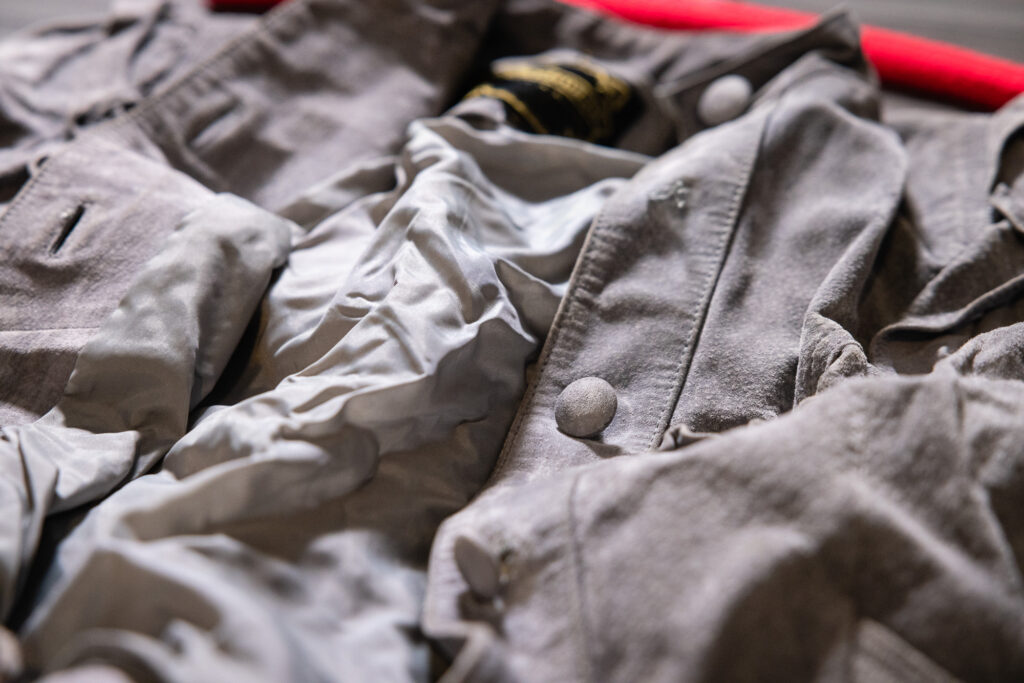
Shane Minor: And her son Adam would stay at her parents’ house?
Cary Hartmann: Yes.
Shane Minor: Mmkay. So you described that you were pretty close with her.
Cary Hartmann: Yes.
Cary Hartmann interview: Cary’s timeline
Shane Minor: Now, this week of October 2nd, October 2nd was on a Wednesday. And I printed out, just to help, help explain (unintelligible) it’s a map that I had printed out, it’s just a blank calendar—not a map, sorry—of October 1985. It shows the 2nd being on a Wednesday. To help maybe refresh your memory (unintelligible) if something pops up that you can remember. So, during this week, do you have any recollection at how much she was staying at your place that week or—
Cary Hartmann: No.
Shane Minor: —what had been going on that week?
Cary Hartmann: I can’t remember anything significant that indicates anything was going on during this week. Umm, I just can’t remember (unintelligible)—
Mike Elliott: Did she stay at your house the Tuesday night?
Cary Hartmann: Yes, let’s see, yes. Because she got up, we got up, she got dressed, put her work clothes on and give me a kiss goodbye and says “I’m going to work, see ya” and I says “bye, bye.”
Shane Minor: ‘Kay, now we’re talking Tuesday morning, from the first?
Cary Hartmann: Right.
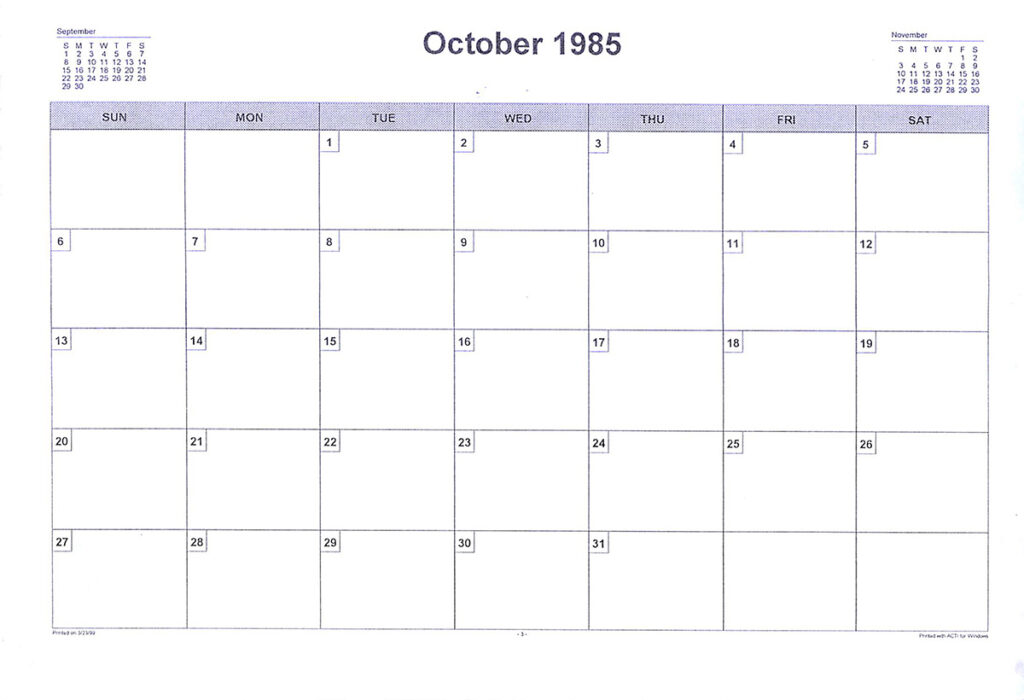
Shane Minor: And where did she work at?
Cary Hartmann: She worked in Salt Lake at the credit union. I can’t remember the name of the credit union.
Shane Minor: The credit union in Salt Lake City. And that was on Tuesday?
Mike Elliott: Or no, Wednesday morning—
Cary Hartmann: Wednesday morning.
Mike Elliott: —she got up that morning?
Shane Minor: Ok, what’s—
Mike Elliott: —Tuesday night she stayed over.
Shane Minor: Tuesday night, Wednesday morning.
Cary Hartmann: Right.
Shane Minor: Ok, so Wednesday night, or Wednesday morning, Tuesday night, she spent the night with you—
Cary Hartmann: Right.
Shane Minor: The day before. Was there any problems Tuesday night or—
Cary Hartmann: Nothing whatsoever.
Cary Hartmann interview: A story about Charles Warren
Shane Minor: Now, did she have any concerns? Do you remember having any conversation, of having any kind of concerns about anything or having any problems with anybody?
Cary Hartmann: Umm, previous to this, she’d told me about her ex-husband, that he was extremely violent [personal information removed by COLD]. Later on he lured, can’t remember his name, he lured—I can’t remember his name—he lured [Chuck Warren’s ex-wife] Alice up Ogden Canyon, uh, on the pretext that his car was broke down, this is in a police report, and he beat her with a tire iron. Put her in the hospital. They tried to get Alice to take a polygraph test, and she got up to it and decided not to.
Shane Minor: About being beaten by the tire iron?
Cary Hartmann: About everything about her ex-husband. About the whole, I don’t think she filed a police report about that, but I think there was a police report made. But that’s what happened. Sheree told me that’s what happened.
Mike Elliott: Mmkay.
Cary Hartmann: So in that, Sheree’s credit union in Ogden, her husband walked, ex-husband at that time—
Shane Minor: Same ex-husband?
Cary Hartmann: Same guy.
Shane Minor: Ok, I think, was it Charles Warren, Chuck Warren. That—
Cary Hartmann: Chuck—
Shane Minor: —is that the person you’re talking about?
Cary Hartmann: Yeah.
Shane Minor: Ok.
Cary Hartmann: I couldn’t remember his name. Walked in the credit union, and the reason I know it is the credit union manager told me this at the time. I can’t remember her name. But he was upset that Sheree, I think he was paying her alimony, and she was going to take him to court and up the alimony or get child support because she was unable to make ends meet at that time. So, she was dragging him through court, or back into court again, and he was really upset. He went into the credit union, had a suit coat on, the manager was behind the counter or at her desk nearby, and it was also the credit union was right near the college and so I was in there often and knew the, a couple of the ladies and stuff. And his coat come open, and he had a gun tucked in his waistband.
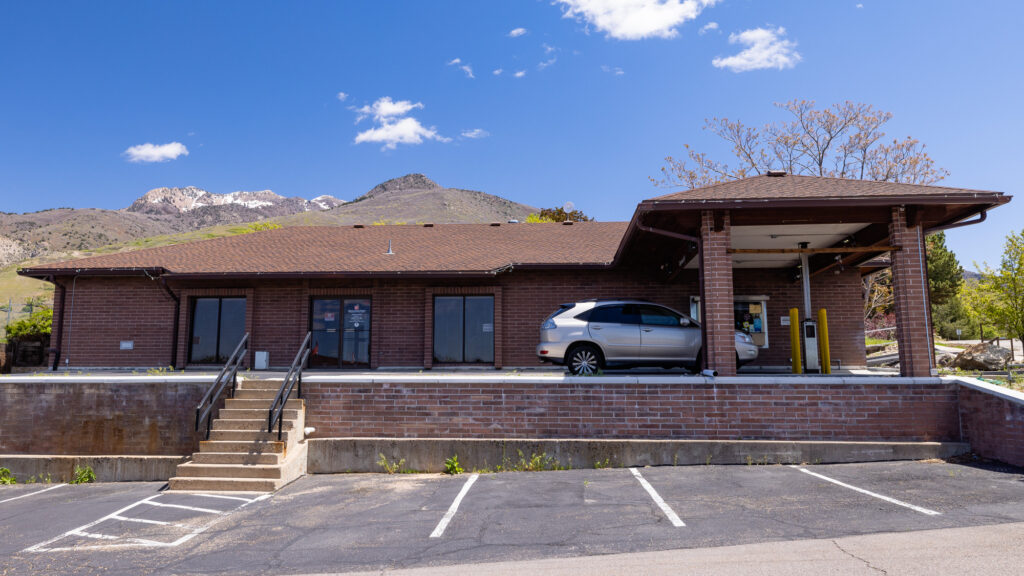
Shane Minor: And who’s telling you this?
Cary Hartmann: Credit union manager, at that time. I can’t remember her name. And it scared her and scared the teller that was behind the counter. I think she indicated to the manager “look at that, he has a gun tucked” and wanted to know where Sheree was. Uh, I can’t remember if she was there or not. It seems to me that she was there, and they all saw this. And he made a few statements about you taking me to court, and it’s causing me grief and anguish and a few bad words and out the door he went. And this all come down from the manager of the credit union at this time.
Shane Minor: Did, did Sheree tell you anything about that or say anything about that? Or say anything to you about it?
Cary Hartmann: Yes she did. Said it scared her. She confirmed what the credit union manager had said. And she said this is like him. He’s a violent kind of person, anyway.
Shane Minor: Ok but, when would she have said that stuff to you? Prior to—
Cary Hartmann: Prior to.
Shane Minor: —this, would it’ve been like a week before or was that a month before the incident, the summer, or spring?
Cary Hartmann: Weeks before this so—
Shane Minor: Ok.
Cary Hartmann: —August.
Shane Minor: And then, when you talked to the credit union manager, what period of time was that?
Cary Hartmann: Within a short period of time after Sheree told me so within August, September.
Shane Minor: Ok. So it again—
Cary Hartmann: —I’d say—
Shane Minor: —you’re talking about a few weeks before.
Cary Hartmann: —right, right. And I can’t be positive about that.
Cary Hartmann interview: “Not a clue” about Sheree Warren
Shane Minor: Ok, that’s fine. ‘Kay uh, maybe what I’d ask you then, uh, let’s put this on hold for just a second as far as the 2nd. You’re talking about her ex-husband. Now, you remember that date, do you remember the time, uh, what you think happened to her?
Cary Hartmann: (Laughs) I’ve asked myself that every day for the last 20 years. I don’t have a clue.
Shane Minor: Have any ideas?
Cary Hartmann: I don’t have an idea, no, not one, not one. She was so responsible, so sharp and so smart that they, uh, the credit union chose her to go to Salt Lake to train managers, to train people to be managers, and she wasn’t even a manager. That’s how smart she was. She was working (unintelligible) So if she said that she was going to meet me at the corner of 12th and Vine, just a figure of speech, she would be there. That’s the kind of gal—
Shane Minor: She was reliable.
Cary Hartmann: —she was so reliable and so, uh—
Mike Elliott: Pretty good?
Cary Hartmann: Yeah.
Shane Minor: Who do you think is responsible for her disappearance?
Cary Hartmann: I don’t have an idea in the whole world. I don’t have a clue.
Shane Minor: So you, you don’t, you don’t have any, any opinion? And that’s all I’m asking you is—
Cary Hartmann: I can appreciate that. I know where you’re coming from, I know.
Shane Minor: Alright, let’s back, let’s go back up then ‘cause I want to just ask you and I didn’t ask you that at the very beginning. She stayed overnight with you on Tuesday night.
Cary Hartmann: Mmhmm.
Shane Minor: You guys, you guys didn’t have any arguments, any fights—
Cary Hartmann: None whatsoever.
Shane Minor: What about that Monday night. Did she stay over with you that night? Or what can you remember?
Cary Hartmann: Probably.
Shane Minor: That would have been, like uh, September 30th?
Cary Hartmann: Yeah, I would say yes only because I can’t remember. I just can’t remember. ‘Cause like I say, sporadically she would run home and check on Adam, and this was pretty often. She was a very responsible little gal. She would run home and check on Adam and mom and dad. And uh, make sure things were ok there, and sometimes she would stay at home, and then sometimes she would stay with me.
Shane Minor: Ok. But no fights, no arguments—
Cary Hartmann: Never—
Shane Minor: —nothing like that?
Cary Hartmann: —never had one.
Cary Hartmann interview: Sheree’s last day
Shane Minor: Ok, tell me about that morning. She gets up, and where are you living at the time?
Cary Hartmann: On the bottom of 7th Street, below two ladies, rented the basement apartment.
Shane Minor: Do you remember what the address is?
Cary Hartmann: I don’t, I don’t.
Shane Minor: You rented the basement part?
Cary Hartmann: I did.
Shane Minor: She left there and went to work. What time did she leave?
Cary Hartmann: Now, that’s a good question. She got up and she got showered and stuff and got dressed and it was, seems to me it was a little before I went to work at Weber State [College]. And I worked at Weber State and I had to be there at 6 or so-so. Call it, it wasn’t too long before, so call it 5 to 5:30ish, something.
Shane Minor: Weber State at 6?
Cary Hartmann: I think it was at 6.
Shane Minor: And so Sheree would have left around 5:30?
Cary Hartmann: 5 to 5:30, somewhere in there.
Shane Minor: And did she drive straight to work?
Cary Hartmann: Umm, I don’t know. I believe she did. I think she went right straight to Salt Lake from my place. I don’t think she made any stops, not that I’m aware of.
Mike Elliott: ‘Kay.
Shane Minor: Alright, and then you went to work at 6:00 up at Weber State?
Cary Hartmann: I did.
Shane Minor: Alright, so, tell me about your day first. You went to work at 6:00 in the morning up to Weber State.
Cary Hartmann: Uh huh.
Shane Minor: How late did you work there ’til?
Cary Hartmann: Ok, I worked there till about 4:30, about 6 to 4. I can’t remember, I can’t remember the exact hours. About 4:30 I went directly home because I had another job to be to so I got home, I got showered quickly. The phone rang.
Shane Minor: About what time was that that you got home at?
Cary Hartmann: Umm, call it between 4:00 and 4:30 because I can’t remember exactly.
Cary Hartmann interview: An alleged call from Sheree
Shane Minor: You got a phone call?
Cary Hartmann: I did, about 4:30.
Shane Minor: Who from?
Cary Hartmann: Sheree.
Shane Minor: Ok.
Cary Hartmann: She, she was in Salt Lake at her work. Telephone records verified that. You can check on that.
Shane Minor: Ok, and you were showered and you were on your way to another job.
Cary Hartmann: I had my keys in my hand and I was just headed out the door. I was going to NICE Corporation where I worked on the phone.
Shane Minor: Can you tell me, do you remember the context of that conversation?
Cary Hartmann: Yeah, pretty much. She says, uh, “what you doing?” And I says “well, I’m just headed to work, out to NICE.” “Oh, ok.” I says “how are you?” “Fine.” “How was your day?” “Good, I’m training this guy.” Says “it’s been going along ok. Been working with him for the past couple, three, four days.” She says “what are you going to do after work?” And she meant after NICE because that’s where I was heading and got off there about 9.
Shane Minor: Ok, what time were you, do you remember what time you were supposed to go to NICE, work at NICE? I mean, you’re leaving about 4:30.
Cary Hartmann: Yeah so, so maybe, maybe 5.
Mike Elliott: Ok.
Cary Hartmann: ‘Cause the hours were different there. You pretty much got there when you checked in, but you had to be there by a certain time.
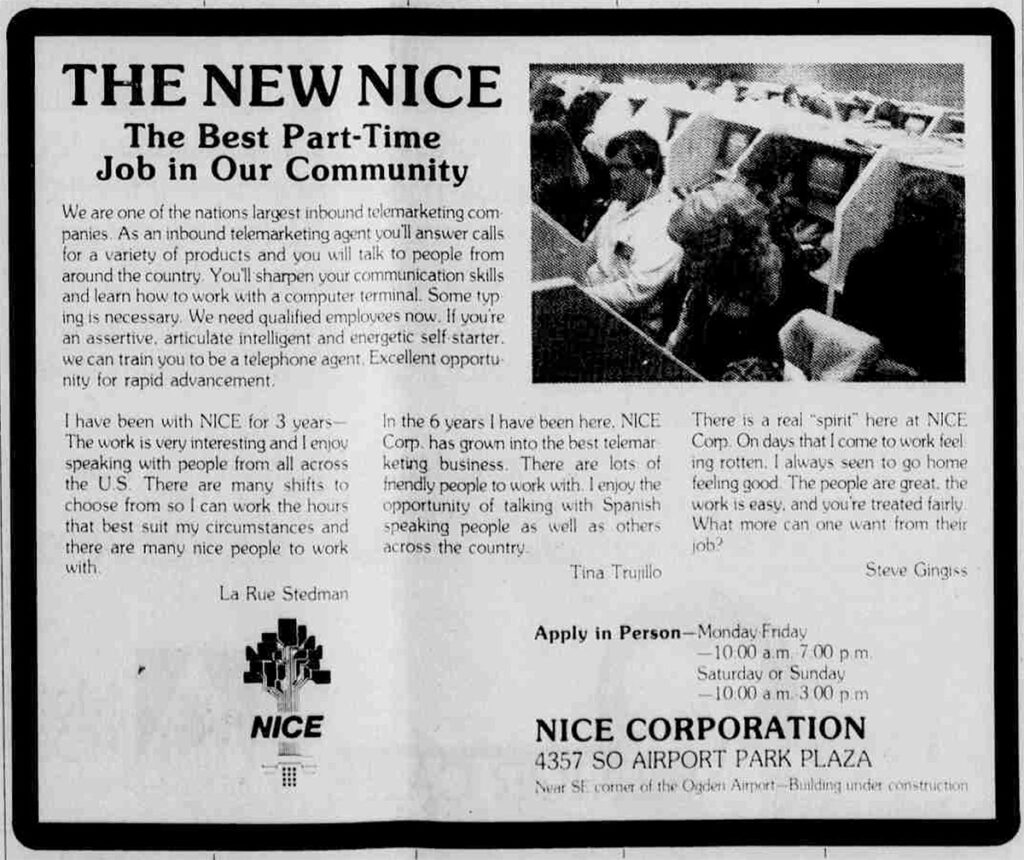
Shane Minor: Do you remember what time that was?
Cary Hartmann: It took me 15, 20 minutes to get there, so call it 5 o’clock—
Shane Minor: Ok.
Cary Hartmann: —I think, because I had to really hustle to get there.
Shane Minor: Did you have to be on time or was it the type of place to where you could be a few minutes late—
Cary Hartmann: No, you had to be on time, but you could be there early. Up to the hour you had to be there.
Shane Minor: Ok, and she asked? I’m sorry—
Cary Hartmann: She says, uh, “what are you goin to do after work?” And I says “well,” I says I was going to stop down to Sebastians and have a drink with Dave, my best friend. Dave Moore.
Shane Minor: Dave Moore?
Cary Hartmann: You know Dave.
Shane Minor: Ok.
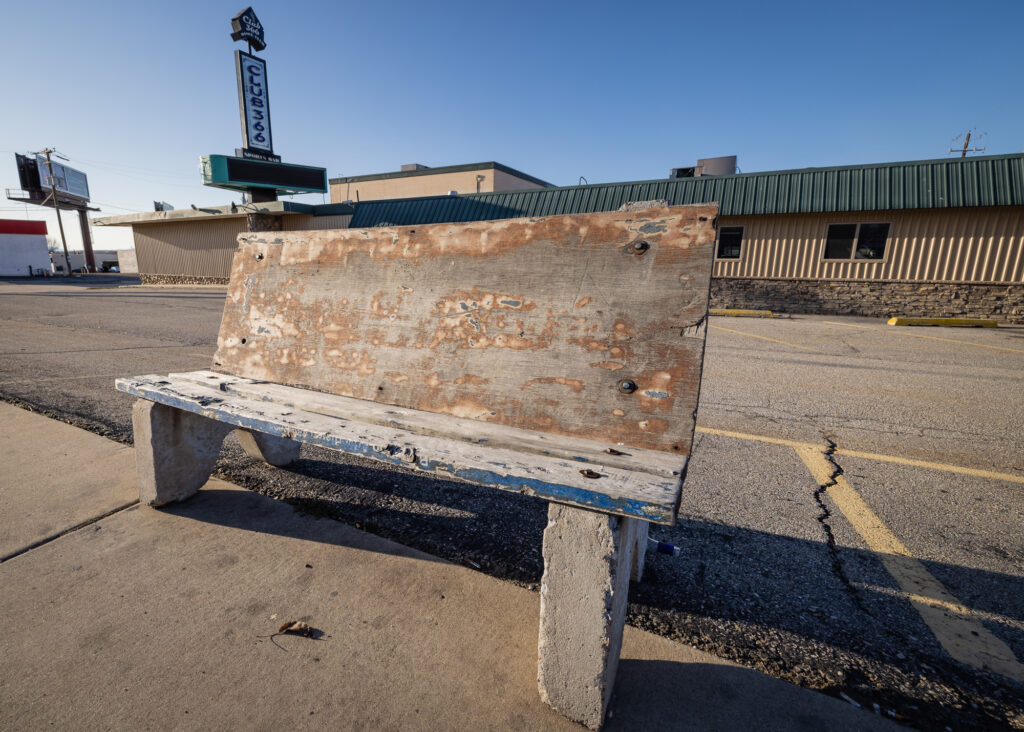
Cary Hartmann: And she says “oh, ok.” And I says “well what are you,” y’know, “what’s your plans.” She says, “I’m coming right directly home, I’ll be waiting for you when you get home at the house.”
Shane Minor: So she was coming, she was going straight to your house on 7th Street?
Cary Hartmann: Right. That’s what she said.
Shane Minor: Ok. And then what time did you get off? What time were you getting off work at NICE?
Cary Hartmann: About 9 o’clock.
Shane Minor: Ok.
Cary Hartmann: Mmhmm.
Shane Minor: And that’s what time you were going to meet Dave Moore at Sebastians?
Cary Hartmann: No, I told Dave “I’ll meet you after work.”
Shane Minor: After—
Cary Hartmann: After NICE Corporation. He knew I get off at 9 so he was waiting at Sebastians when I got there.
Shane Minor: But you get there after 9?
Cary Hartmann: Right.
Shane Minor: ‘Cause you worked until 9, and then you left and met him after that.
Cary Hartmann: Yes sir.
Shane Minor: Ok. When you left work at NICE, did you drive straight to Sebastians?
Cary Hartmann: Straight there. I got there about 9:15, 9:20.
Shane Minor: Ok, and Dave Moore was already there?
Cary Hartmann: He was. The place was filled. Dave was there.
Shane Minor: How did your conversation end with her? She said she was coming straight to your house?
Cary Hartmann: Uh, she says “so you’re goin’ to be all night down there drinkin’.” I said, I remember this, I said “nope.” I said, “I’m going to have a drink with Dave, and I’m coming right straight home.” She said, “ok, great, I’ll be waiting for you at home.” She was kidding, of course.
Shane Minor: About what?
Cary Hartmann: She said, “are you going to stay down there drinking all night?” Said “oh, no, no. I’m going to have a drink with Dave and I’m coming home.” “Ok.” And that’s exactly how it went.
Shane Minor: (Unintelligible) And that, was that the conversation? Or—
Cary Hartmann: That was it. “Love you.” “Love you, too.” “See ya, bye.”
Cary Hartmann interview: The night Sheree disappeared
Shane Minor: Ok, so then I take it, that’s around 4:30 or so.
Cary Hartmann: Uh huh.
Shane Minor: You leave house?
Cary Hartmann: Right.
Shane Minor: And you drive out to?
Cary Hartmann: NICE.
Shane Minor: NICE Corporation. You remember how you drove out there?
Cary Hartmann: Went out and got on the freeway at 21st ‘cause that was the quickest way. Zipped on the freeway and was right there, off the freeway exit.
Shane Minor: Which exit?
Cary Hartmann: Oh I don’t even remember. Right there at the Ogden Airport Exit? Which one’s that?
Shane Minor: 31st Street?
Cary Hartmann: Probably (unintelligible).
Shane Minor: Thirty, I think 31st Street would be the Ogden Airport.
Cary Hartmann: Yeah. That’s, that’s exactly how I went. Puts you on, close to Pennsylvania Avenue.
Shane Minor: Yeah.
Cary Hartmann: Went down the the Airport (unintelligible).
Shane Minor: What did you drive at that, that period of time?
Cary Hartmann: My pickup.
Shane Minor: What kind of pickup was it?
Cary Hartmann: Umm, half-ton—
Shane Minor: Was that the yellow or—
Cary Hartmann: —gold.
Shane Minor: —gold one. And you you stayed at work until 9:00?
Cary Hartmann: Yep.
Shane Minor: Did you talk to her after 4:30 that day?
Cary Hartmann: Nope.
Shane Minor: On the phone, you didn’t call her? She didn’t you at work?
Cary Hartmann: I never talked to her again.

Shane Minor: Ok so, she left your house that morning around 5:30 and from what you know she drove straight to work—
Cary Hartmann: Yeah.
Shane Minor: —in uh, Salt Lake. What was she driving that day?
Cary Hartmann: Her car.
Shane Minor: And I might be wrong but does Toyota sound?
Cary Hartmann: Somewhere, yeah.
Shane Minor: Do you remember what color it was?
Cary Hartmann: Maroon Toyota, I don’t remember the year.
Shane Minor: And then you talked to her that one time that day around 4:30. And that’s when you were on your way to NICE Corporation. You worked ’til 9:00 and then after that you go down to Sebastians and meet Dave Moore?
Cary Hartmann: Right.
Cary Hartmann interview: A drink with a friend
Shane Minor: Do you remember anything about that? About going down to Sebastians that night?
Cary Hartmann: I arrived. When I got there, Dave was there and the place was really busy so I ordered a drink, and I drank that. And he said “well, how’s it going?” “Fine.” Y’know, “is Sheree come home from work?” And I says “yeah, she’ll be home from the credit union, she’s gonna meet me at home.” And I said “I’ll have one drink and I gotta go. That’s what I told her, and that’s what I’m going to do, period.” He says “ok,” he says “well, why don’t you call and have her come down here?” Well, that’s a good idea so I went to the phone. Called home. It rang three, four or five times.
Shane Minor: Do you remember what time that would have been about?
Cary Hartmann: Uh, about 45 minutes later. I don’t, I don’t remember exactly. It could have been an hour.
Shane Minor: Thirty, thirty minutes to an hour later.
Cary Hartmann: Yeah.
Shane Minor: So you called your house on 7th Street?
Cary Hartmann: Right. To ask her if she wanted to come down and have a drink with us.
Shane Minor: And asked her? Or didn’t ask her, but—
Cary Hartmann: No one answered. It rang four or five times. I hung up, I went back and said I said “Dave, she’s not there. Something’s wrong.” And I had this sick feeling because when she says she’s going to be there, she’ll be there, period. But whether she had extreme car trouble, or something weird happened (unintelligible), she should have been there, period.
Shane Minor: And then what happened after that?
Cary Hartmann: I went back and I told Dave, I said “Dave, something’s wrong.” And he said “what do you mean?” And I told him what I told you. And he says “well, maybe you ought to call her mom.” So I did. Right then.
Shane Minor: Ok.
Cary Hartmann: I called Mrs. Sorensen in Roy and I says “hi is,” y’know, “Sheree there?” She said “no, I thought she was with you.” I said “no, she’s supposed to come right home from work, supposed to be at my house.” “Ok, maybe something,” uh. “Did she pick up Adam, or did she have to go somewhere or meet someone?” And Mrs. Sorensen said “not to my knowledge.” And I said “me either.” I didn’t have any knowledge she didn’t have any other meetings planned or she’d have told me.
Shane Minor: And Adam, her son, was at the mother’s house?
Cary Hartmann: Right.
Shane Minor: Did Sheree have to stop by there?
Cary Hartmann: No. Not that her mom indicated (unintelligible).
Shane Minor: And the mother knew she was going to house after work?
Cary Hartmann: I don’t know that. I don’t know that at all.
Shane Minor: Ok, so she hadn’t seen or heard from her. Do you, what time would have that call been about?
Cary Hartmann: To Mrs. Sorensen?
Shane Minor: Yeah.
Cary Hartmann: Oh God, after I called home so within an hour and half-ish.
Shane Minor: So we’re looking around 10:30 or something, 10:30 or 11:00?
Cary Hartmann: Yeah, about. That’s pretty rough. I can’t remember exactly.
Shane Minor: Do you remember how long you stayed at Sebastians?
Cary Hartmann: Yeah, I stayed there for a while. Uh, had a few drinks. Actually I was thinking maybe Sheree would call, or, because she knew where I was from our previous conversation so she knew where I was. I figured maybe I’d get a call from her. Nothing So, I can’t tell you what time because I just don’t know.
Shane Minor: Thought she might call you there?
Cary Hartmann: Well, I thought the possibility was that she that she would call me because she knew that I was there. If something was wrong, something was up, then she would give me a call. She just wouldn’t leave me hanging, or anyone else for that matter.
Shane Minor: And what time would you guess that you went home? Or what did you do after you left Sebastians?
Cary Hartmann: 11:30, drove straight home, about. I’d say, about 11, about 11:30. Drove straight home.
Shane Minor: How did you drive home? Do you remember?
Cary Hartmann: Uh.
Shane Minor: I know it’s been a long time.
Cary Hartmann: Probably like, probably straight down Washington, I’m thinking.
Shane Minor: Ok. Did you do anything once you got home? Did you make any stops on the way?
Cary Hartmann: Not one. Drove straight home.
Shane Minor: And then what did you do once you got home?
Cary Hartmann: Uh now, mind you, my, truck had a, had a noisy muffler system on it. Big old glass pack. So, the ladies upstairs told me “we hear you coming in and out” because I have to traipse up and down the steps and they always heard my trucks in the driveway, leaving or coming or right after in the morning, come at night, whatever. I tried to be as quiet as I could but it was just too noisy. So they knew when I come home. They know when I leave and when I go to work in the morning and stuff like that. I come home. I park the truck right in the driveway, right, right next to the house and go to bed. I didn’t do anything else, washed up. I did nothing else. Went to bed. I had to get up early.
Shane Minor: Ok, so if you left 11:00, 11:30 you’re probably back home and in bed by midnight or so?
Cary Hartmann: 11:00 or 11:20. It doesn’t take long to drive home.
Shane Minor: Ok.
Cary Hartmann: So—
Shane Minor: So just as a window we’re talking anywhere from 11:20 to 11:45. I mean, you tell me what sounds fair. I’m not, I’m not trying to tie it to the exact time but just—
Cary Hartmann: It’s not—
Shane Minor: —we’re talking—
Cary Hartmann: —‘cause I, I ‘cause I never, ever considered the timelines. How long was I there? When the phone call was made? I never have ever even considered those. Things just happened, y’know, so—
Shane Minor: Ok.
Cary Hartmann: —so I don’t remember, but that sounds right.
Cary Hartmann interview: The morning after
Shane Minor: Ok. So now Thursday morning. What do you recall that day?
Cary Hartmann: I got up early, same schedule.
Shane Minor: What time?
Cary Hartmann: Five, 5:30 I believe. I think that’s what it was. I had to be at work at 6. I want to say 6, ‘cause I was on an early, early schedule. I had to be there and monitor the computers to punch in and all that stuff.
Shane Minor: So you got up 5, 5:30 and went to work?
Cary Hartmann: Right.
Shane Minor: Did you leave work during the day or?
Cary Hartmann: No, nuh-uh.
Shane Minor: You work all day?
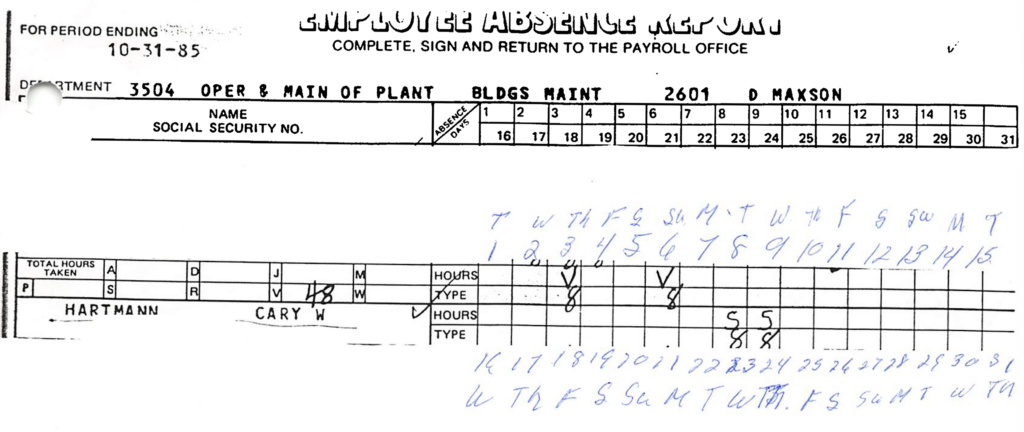
Cary Hartmann: About noon is when I called Roy City and filed a missing person’s report. I was getting worried, worried, worried. It was about noon ‘cause they, I remember trying to call them previously, and they said you can’t file a missing person’s report until the person’s been gone 24 hours. I thought “man.” I was just sick from worry.
Mike Elliott: Did you call her mom or her work before noon that day or?
Cary Hartmann: Well, I called her mom that night, and, uh, believe I called the next morning.
Mike Elliott: Did you think maybe she’d come home and maybe gone to work or?
Cary Hartmann: No (unintelligible), no because she like, like I said she’s so responsible she she’d have either been at my house, been at her mom’s house and called me, or called me from wherever she was at. I knew that would absolutely happen. I could rely on her.
Mike Elliott: You think she was in trouble by then?
Cary Hartmann: Yeah, she wasn’t home, hadn’t called in, absolutely. I thought something’s up. This gal, oh no. If she hadn’t been dependable, every single thing she said was absolutely the way it was. I mean, her work (unintelligible) the epitome of that, too. She was sharp enough to train managers—
Mike Elliott: Yeah.
Cary Hartmann: —she was line, in line to be a manager when she was 27. Sharp, so.
Shane Minor: Did you talk anyone else, say Wednesday night? She called you at 4:30. You went to work and is that, that NICE Corporation. Is that a telemarketing type of thing or—
Cary Hartmann: Right. Both. People everywhere.
Shane Minor: So you went and did that until about 9 and then you went and met Dave Moore.
Cary Hartmann: I did.
Shane Minor: Do you remember, did you talk to anybody else, call anybody else, talk to them about it?
Cary Hartmann: No. Nuh uh. I did my job. I was worried, uh, that uh, get to Dave, you know. I thought wow, ‘cause I thought, we just loved each other to death, and I didn’t want to disappoint her so I thought, I get, after our phone call if I meet Dave at the bar is it going to be too long, is she going to be upset, am I going to disappoint her, I better hustle home. I even considered telling Dave “look Dave I gotta go.” So I said “well, I’ll have one drink with you, period” ‘cause that’s what I told her. But I didn’t, I don’t, I don’t believe I talked to anyone else.
Cary Hartmann interview: Coworkers at Weber State
Shane Minor: Thursday you go to work up at Weber State. Who did you work with? Do you remember who you worked with that day by chance?
Cary Hartmann: Oh, sure. I had a partner, Denis Kirby. I worked with him all day.
Shane Minor: Denis who?
Cary Hartmann: Kirby. D-E-N-I-S K-I-R-R-B-Y [sic].
Shane Minor: And what was your job up at Weber State?
Cary Hartmann: I was, umm, in charge of HVAC.
Shane Minor: HV—?
Cary Hartmann: HVAC. Heating, Ventilating, Air Conditioning.
Shane Minor: Oh, ok.
Cary Hartmann: I was an automation and, and uh, control technician. So, I run around the offices and dial in thermostats and work on compressors and all this.

Shane Minor: And you worked with Denis Kirby, was like somebody you worked with all the time?
Cary Hartmann: Yeah, he was in the same department. And Boyd Hirschi was my boss, and he was in that same office with me. Him and I met periodically all day long.
Shane Minor: Mmkay. So you go to work, work with Denis Kirby. Boyd Hershey is your boss.
Cary Hartmann: Correct.
Shane Minor: Did you run into anybody else or talk to anybody else that morning? Do you remember?
Cary Hartmann: Oh, it was Weber State College campus. It was filled with people, saw ‘em everywhere. (Laughs) I can’t—
Shane Minor: I mean, anybody that you remember having conversations with. Other than a casual “hi, how you doing,” you know, people that were working up there or seeing (unintelligible) something like that.
Cary Hartmann: Uh, no, I can’t, I can’t remember one person. There’s plumbers and maintenance people and we worked with them all day long. And we’re all over in the buildings. But I can’t remember—
Shane Minor: Did you have a conversation with Denis Kirby or Boyd Hirschi about Sheree?
Cary Hartmann: Sure, sure. I said I was worried that she didn’t show up and what should I do? And I discussed with them the whole thing. I was supposed to meet her and related the story just I related to you guys. But I got (unintelligible). Expressed concern because the cops said you can’t call for 24 hours and I’m like “gosh, what am I gonna do” and stuff like that. So I was worried, worried about it. So they knew when I, when I called and what was up. Were right there. Called right in front of them.
Shane Minor: So you call Roy City about noon—
Cary Hartmann: Uh huh.
Shane Minor: —ok, uh, tried to make a report. What happened, did you make any other phone calls to anybody that day—
Cary Hartmann: No.
Shane Minor: —do you remember?
Cary Hartmann: Not that I remember.
Shane Minor: So you finish, go back to work that afternoon, I assume.
Mike Elliott: After your, noon, I, I assume that you’re that taking, your, you’re on your lunch break when you’re making your phone call because you say it’s at noon?
Cary Hartmann: No, I made it right in the office.
Mike Elliott: Ok.
Cary Hartmann: Right, it was right in the office.
Mike Elliott: But that was right—
Shane Minor: Did you have lunch that day? I mean would you leave the campus or would you stay and have your lunch?
Cary Hartmann: No, if we left the campus most of the time it would be over to Hardee’s which was just on the corner of the campus. But I went with these guys to lunch most of the time.
Shane Minor: You do, all of you would go to lunch together?
Cary Hartmann: Or we’d go to the Union Building or we’d go to Hardee’s and grab something, come back, but I didn’t leave. Sometimes I’d bring my lunch. Most of the time I didn’t. (Unintelligible) I didn’t like packing a lunch.
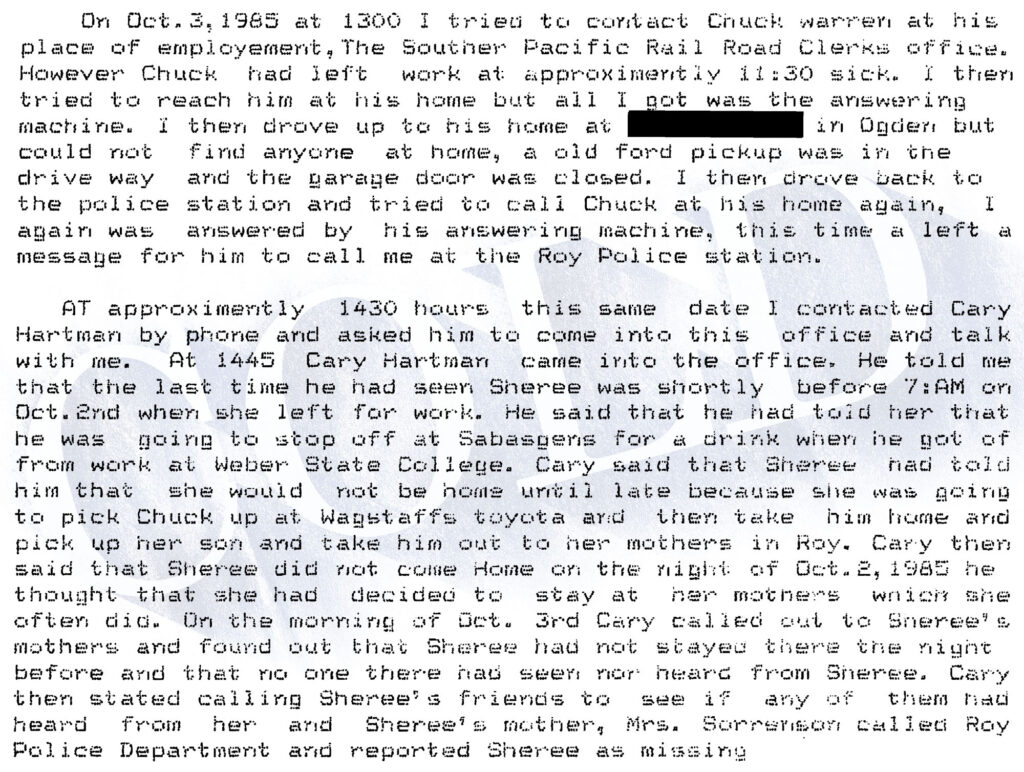
Shane Minor: So how late did you work ‘til that day?
Cary Hartmann: Same shift.
Shane Minor: ‘Til four o’clock?
Cary Hartmann: Yes, yeah.
Cary Hartmann interview: Just a blur
Shane Minor: And then what happened? What did you do after that?
Cary Hartmann: Next year and half is a blur. I think I went home and got cleaned up went to work at NICE.
Shane Minor: How often did you work at NICE?
Cary Hartmann: Oh brother. Seems to me it was four or five days a week, I want to say.
Shane Minor: And was it the same shift, too? You worked Weber State from six in the morning ‘til four, go home clean up and then you’d be at NICE from 5 ‘til 9?
Cary Hartmann: Uh huh.
Shane Minor: And that was four or five days week. Do you remember was it during the week, on weekends too, or?
Cary Hartmann: I think it was during the weekdays, as I recall.
Shane Minor: Monday through Friday?
Cary Hartmann: I believe. Sometimes it was on a Saturday. You know I just can’t recall. (Unintelligible)
Mike Elliot: Ok. So you have no idea of how many hours you worked or you say you worked there part time does that mean you worked there once a week or was it more of a—
Cary Hartmann: Well, I think—
Mike Elliot: —part-time job it sounds like.
Cary Hartmann: Part-time job of like four hours, four or five hours a shift. They wouldn’t allow you work eight hour shifts all the time.
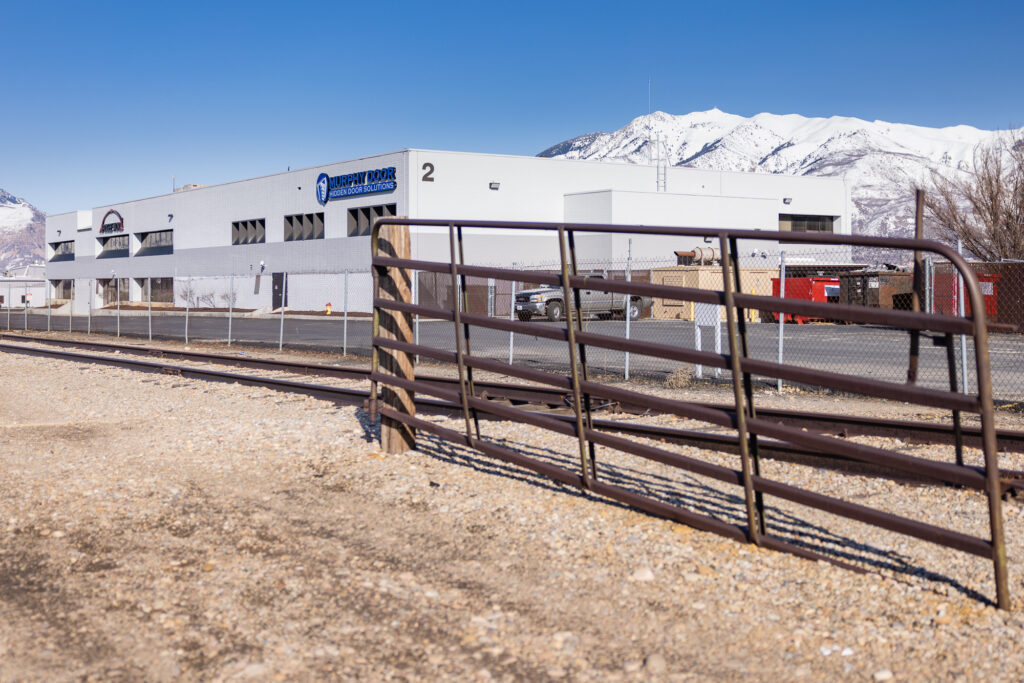
Shane Minor: So you would’ve went to work. Do you remember, did you make any calls, inquiries about her? Did you receive any information?
Cary Hartmann: I didn’t receive any information at all. I think, I can’t remember how, how quickly I went out and started talking to Roy Police. ‘Cause I knew Jack [Bell], went to school with him and found out he was out there. Uh, but it was pretty soon after that I wanted to find out what they found out, what they knew, what was going on, called her folks.
Shane Minor: Do you remember when that started?
Cary Hartmann: I don’t. It was that day, the next day, and it continued on. That day, that evening, after I got home. “Have you heard from Sheree?” Over the phone.
Shane Minor: Did they say anything?
Cary Hartmann: Nope.
Shane Minor: The worried about (unintelligible)?
Cary Hartmann: And I know either I called her work or her mom says “I’ll call her work right away and find out if they’ve heard from her” or anything like that. I can’t remember exactly what she said. (Unintelligible)
Shane Minor: Ok. What about that weekend? Uh, ‘cause we’re now at Thursday. So you went to work Thursday night and back to Weber State on Friday?
Cary Hartmann: Mmhmm.
Shane Minor: And then would you work at NICE on Friday night?
Cary Hartmann: Uh, yeah, there again I can’t remember the exact shift.
Shane Minor: ‘Kay.
Cary Hartmann: So when I say “yes,” I’m thinking you’re thinking “well if he says this, and it isn’t,” then he’s—
Shane Minor: No I, and I understand that, I’m just trying to get an idea of the days that you best remember.
Cary Hartmann: Ok. There again, I can’t remember a full shift, whether it was four days or if it was five days. But if I worked a full shift, either four or five, then I’d be back to work on a Friday night.
Shane Minor: You think, what would be your best guess? Take a, just take a minute and think about it. She leaves work on Wednesday night, the 2nd, you had a drink with Dave that night and then you go home. You go to work the next morning, on Thursday. You work all day—
Cary Hartmann: Mmhmm.
Shane Minor: —you go to work. Do you remember having conversations with anybody, other than the people you’ve mentioned? Did you call anybody else, do you have any other friends, uh, family anything at all that you talked to?
Cary Hartmann: Oh, sure I did. I called, let my folks know, my, my kids. See, most of the time on Friday nights at that point I picked up my two boys from my ex-wife, and I had them most of the time Saturday and Sunday, Saturday and Sunday, Saturday and Sunday.
Shane Minor: (Unintelligible)
Cary Hartmann: So they knew. They were old enough to understand what was going on. So my kids knew. Uh, I don’t know if my ex-wife did. I don’t recall calling her and saying anything to her at all. We didn’t—
Shane Minor: Ok. But you have them on Saturday and Sunday then?
Cary Hartmann: Uh huh.
Shane Minor: Was that every weekend or every other—
Cary Hartmann: Pretty much, y’know pretty much every weekend. My ex at that time worked retail and so it was convenient for me to pick them up Saturday and Sunday, plus I loved it. It’s just something I did.
Shane Minor: And what was her name?
Cary Hartmann: My ex?
Shane Minor: Uh huh.
Cary Hartmann: [Personal information removed by COLD]. So I don’t know if she had any information. And I didn’t call and tell her purposely. I don’t remember that at all.
Cary Hartmann interview: The weekend after
Shane Minor: You think you would’ve had your kids that weekend?
Cary Hartmann: Probably.
Shane Minor: Do you remember anything else about that weekend?
Cary Hartmann: I don’t, no.
Shane Minor: Do you remember when you went out and talked with Jack Bell, uh, about this? ‘Cause you talked to him at some time.
Cary Hartmann: Yeah, I can’t remember if it was in the first few days, here or the first couple days here. But it was right after. I wanted, called him, wanted to know what he knew and stuff like that. So, I don’t know if it was here, here, here or here, I just don’t remember the exact day, but it was, it was within the first week or two or something. First week or a few days or day. I just can’t be exact on it.
Shane Minor: Think of anything extra at this point?
Mike Elliot: No.
Shane Minor: Can you think of anything else at this point?
Cary Hartmann: No.
Shane Minor: Is there anything you can think of up to this point? Anything unusual or strange?
Cary Hartmann: Uh—
Shane Minor: Or anything different that you remember, that you might have been (unintelligible).
Cary Hartmann: No, not, not at all, whatsoever. The only thing I can, that I can remember is—
Mike Elliott: I wonder, did you speak with the neighbor ladies and asked them if they’d seen her come to your house that night or seen her car around since she was missing?
Cary Hartmann: Oh no, nuh uh. No. That didn’t even cross my mind. She would have no reason to do that, whatsoever. If she was coming, she would be there.
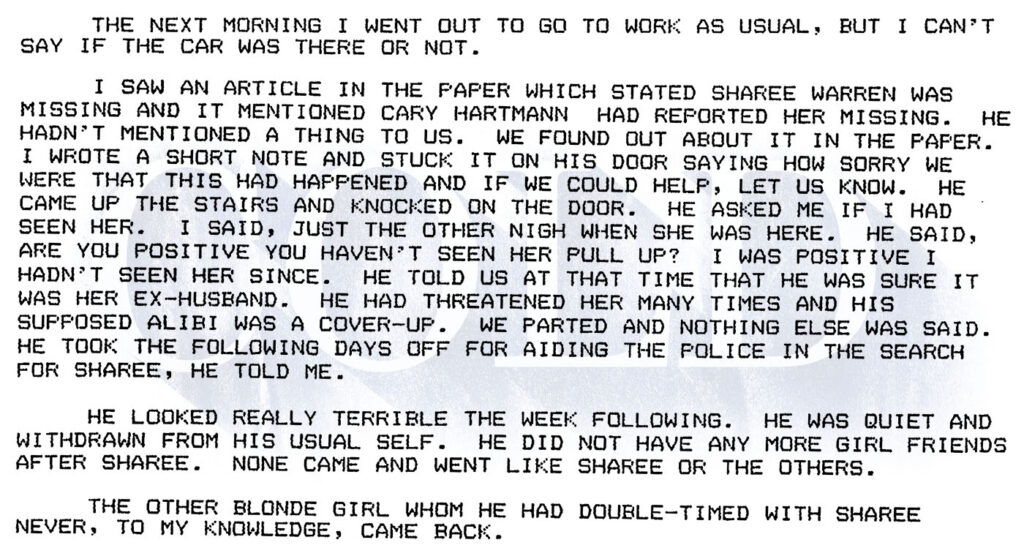
Mike Elliott: But I wondered, maybe they saw her come that night and then leave or something. Maybe she did make it to your house and then left. Y’know, that might be something you might ask ‘em.
Cary Hartmann: I didn’t even consider it. Like I say, she was so dependable I just figured for her to be there or not.
Mike Elliott: Yeah.
Cary Hartmann: I didn’t even consider that option.
Shane Minor: Tell me, what was your schedule like around that period of time? And I’m talking about this whole month. You’d been staying with her quite a bit, I mean you’d described she’s been at your house, uh, almost on a daily basis or pretty regular.
Cary Hartmann: Uh huh, uh huh.
Shane Minor: Uh, what did you do?
Cary Hartmann: You mean from then on?
Shane Minor: Yeah, after you went to work and that weekend.
Cary Hartmann: Yeah, I went to work, got my kids, come home, spent time with my kids, went to work.
Cary Hartmann interview: Sheree Warren’s friends
Shane Minor: Did you have any ideas where she might be or hunches or anything like that that you went and explored yourself or looked in to?
Cary Hartmann: No. Uh, the whole (laughs), so I did this for a year and a half with Jack [Bell]. I was out bugging Jack every day until he, I’m sure he thought I was just driving him crazy at Roy City police.
Shane Minor: When you say you was out bugging everyday, when would you do that?
Cary Hartmann: On the afternoons after work.
Shane Minor: Between jobs?
Cary Hartmann: Right, or after I got off work with, if my schedule did permit at NICE.
Mike Elliott: She have any friends or anything that she’d maybe hang with or—
Cary Hartmann: Her—
Mike Elliott: —we could go and check?
Cary Hartmann: Her work people. Uh, and they’re—
Mike Elliott: Like maybe usually someone has one good girl friend or one strong girl friend they see quite a bit.
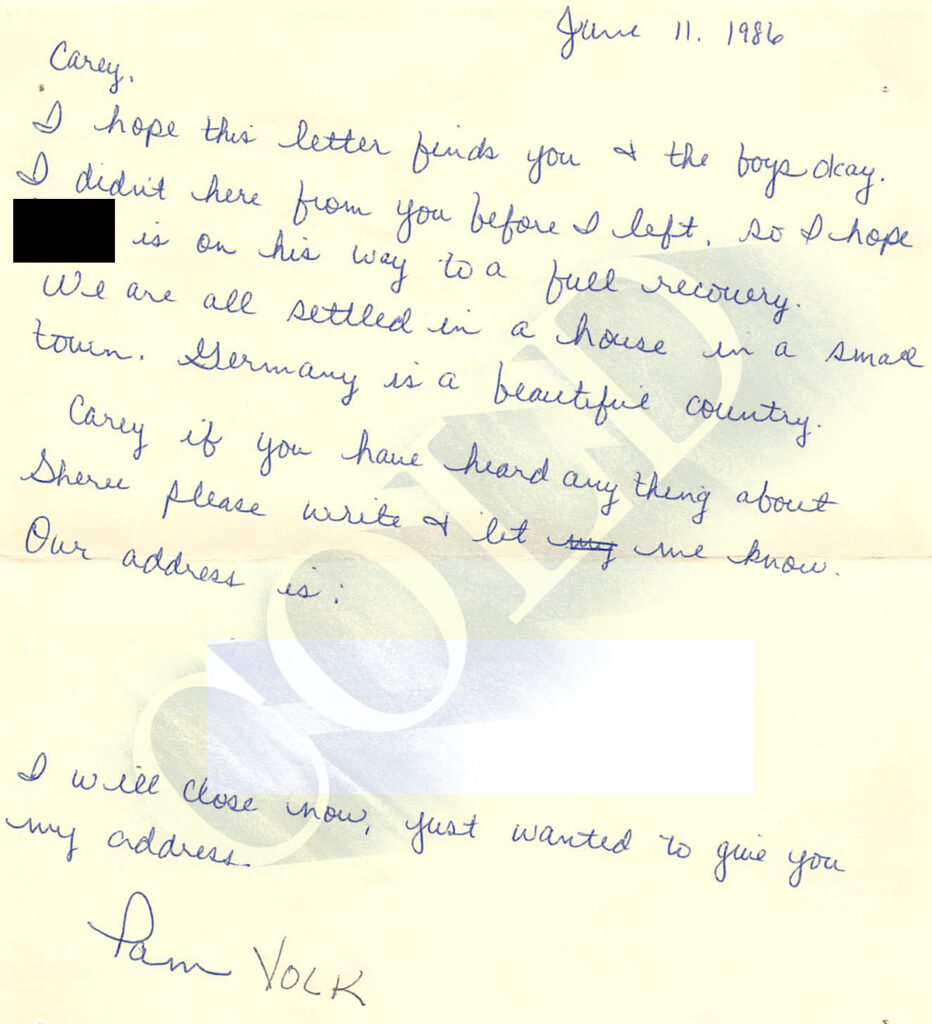
Cary Hartmann: Right. She had the people she worked with mostly were her friends, and she saw those gals all the time. She was extremely friendly. But she didn’t have, I don’t recall one best girl friend. She had a lot of friends, ‘cause she was so friendly with people and stuff and lots of cops, lots of officers stopped in the credit union.
Mike Elliott: Oh, where she worked?
Cary Hartmann: Oh yeah, she was friends with lots of, of officers and stuff, and she would mention that, and I’d say “hey, that’s cool.”
Shane Minor: Do you remember the names of some of her friends? Her, that were her, say, closest friends, or—
Cary Hartmann: I don’t, I don’t. She was friends with and really close with her sister, her younger sister, and her mom and dad were really close to her. I realize that’s family but she was really close with them. And I became close with them also. I’d spend a lot of time out there picking her up and her and Adam then we’d go fishing, and just camping, not necessarily camping but, umm, picnicking and stuff like that.
Cary Hartmann interview: Cary remembers the fried chicken
Shane Minor: Where would you go?
Cary Hartmann: Uh, well we went fishing up to Lost Creek once, her and I, my two, my two boys and her son.
Shane Minor: That was, that was once, you say?
Cary Hartmann: Mmhmm, just once.
Shane Minor: Where was the other places you’d go? You said you went—
Cary Hartmann: Uh, to the parks, to just different parks. We’d throw out a blanket and one time her, her and her mom, I said “let’s make, let’s go buy some chicken.” And she said “no, let’s make it.” So her and her mom made, spent a lot of time and made homemade chicken. The chicken was so good. She was so proud she did that.
Shane Minor: But you can’t recall the names of any, any of her friends or close friends?
Cary Hartmann: I can’t, I can’t.
Shane Minor: And you said there was often cops that were stopping at the credit union?
Cary Hartmann: Oh yeah, lots.
Shane Minor: Do you remember who those guys were?
Cary Hartmann: Uh, I think like Carpenter, was it Rob Carpenter? I think he was one. The only reason I mention that is because she mentioned it once. Sometimes when it was close to her lunch time she said that they would say “hey, what’s up? What are you doing for lunch?” And she’d say “nothing, you wanna go?” “Sure.” So she would, y’know. She was just that kind of a gal, real friendly. And she (unintelligible). Officer (unintelligible) I don’t know if he was a road officer at that time or not (unintelligible). Officer Carpenter took her to lunch once.
Shane Minor: Do you know where he worked at at the time?
Cary Hartmann: I don’t. Is he South Ogden?
Shane Minor: There was a couple of different ones. (Unintelligible)
Cary Hartmann: Oh. (Laughs) Sorry, I’m not much help. I just can’t remember. Washington Terrace, South Ogden. And I‘m sure she mention some others, but I just can’t remember their names. It just wasn’t important.
Shane Minor: ‘Kay. Nothing stuck out about it?
Cary Hartmann: No, nothing whatsoever. I thought it was really cool that they would do that, to go up there. And I always thought that it was really neat that she’d be protected and (unintelligible).
Cary Hartmann interview: Returning to Charles Warren
Shane Minor: She never talked about having any problems with anybody?
Cary Hartmann: She didn’t. The only one that she ever had problems with that made me hinky was her ex-husband. This guy, tell you a little story about him, he had a black Supra at the time, Toyota Supra, black sports car.
Mike Elliot: Oh man.
Cary Hartmann: Well, one was stolen from him which could happen to anybody. The insurance bought him a brand new one, and that one got stolen.
Shane Minor: An insurance thing?
Cary Hartmann: I don’t know. Sounds weird to me. So he had this big, pretty red brick, double red that, y’know, red brick home up on the hill in northeast Ogden, and burglars came in one time and took everything he had, including his carpet.
Mike Elliott: That’s some good burglars taking carpet.
Cary Hartmann: I’m telling you.
Mike Elliot: (Unintelligible)
Cary Hartmann: He was in, he worked at the railroad and he was investigated — Jack Bell told me — he was being investigated constantly by UP&S or UPR&R for drug trafficking. They never could quite arrest him.
Mike Elliott: Huh.
Cary Hartmann: So, therefore, that’s why I say he just give me a buzz. (Unintelligible) I haven’t followed up and don’t care to.
Mike Elliott: Makes you wonder how such a nice girl would end up with him, huh? I guess she must have been young, hooked up with him.
Cary Hartmann: (Unintelligible)
Mike Elliott: Was she was pretty nice, did she get along with your landladies and stuff?
Cary Hartmann: Oh yeah.
Mike Elliott: I guess they were your landladies, you rented from them and—
Cary Hartmann: Right.
Cary Hartmann interview: Two women who’d lived upstairs
Mike Elliott: What’d they say when they found out she was missing?
Cary Hartmann: Oh, they felt terrible, terrible. They were really nice ladies.
Mike Elliott: Did you tell them, or do you remember talking with them about it?
Cary Hartmann: I think I did. Yeah, I says “Sheree was really supposed to be here and she’s not.” Called the missing persons. They felt terrible about it. They were worried.
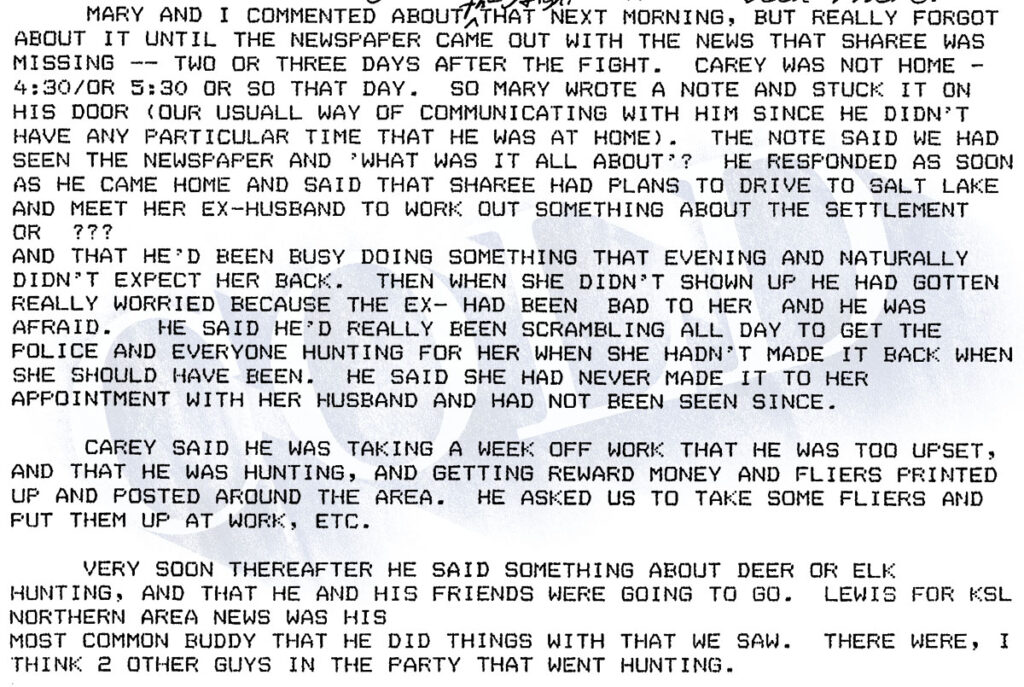
Mike Elliott: Was that the same week, you imagine or?
Cary Hartmann: Probably.
Mike Elliott: Remember when it was?
Cary Hartmann: I don’t.
Mike Elliott: Did they have anything to say about, y’know, the last time they saw her, or?
Cary Hartmann: Nuh uh. Not that I recall. I don’t even recall the exact conversation.
Mike Elliott: Couldn’t offer you any kind of information or anything?
Cary Hartmann: No, nuh uh, no.
Cary Hartmann interview: Shane Minor’s direct questions
Shane Minor: Well, I told you that I had a series of questions I wanted to ask you.
Cary Hartmann: Ok.
Shane Minor: Uh, and the main purpose of the questions are elimination, uh, type of questions you’re going to be asked about everybody, very similar type of questions. And all you have to do is simply yes or no answers. But the reason I’m asking you these questions is because of different information that has been turned in at different periods of time over the years. And it’s hard to kind of go back and go through some of that when a lot of it you don’t know exactly where it came from or you’re trying to put it together. So the only way I know how of doing this is just ask you straight up.
Cary Hartmann: Ok, let me ask you something. How can you put—I don’t know what it is, and I have no problem answering whatever—how can you put credibility then to these series of—
Shane Minor: Well, that’s, that’s exactly it. That’s, that’s, that’s the problem. It’s hard, it’s hard to put credibility to those things.
Cary Hartmann: Sure.
Shane Minor: I mean, I’m sure you know enough, you’re a smart enough person, you know you just can’t take the rumor, go out and y’know? You gotta do your, your homework and you gotta be able to match things out. And you’ve gotta be able to verify, you gotta corroborate, and you’ve gotta do all that. So you might be told a lot of different things. But we’ve gotta be able to do that.

Cary Hartmann: Over the years I heard from second-hand, third-hand rumors from this person, just the most outlandish things concerning me and “were you here?” I says “are you kidding me? Are you really kidding me?” That he said, how can you—
Shane Minor: Let me, let me, uh, let me ask you these questions—
Cary Hartmann: (Unintelligible)
Shane Minor: —let me ask you these questions—
Cary Hartmann: Ok.
Shane Minor: —and then let’s go back to what you’re just talking about. Because maybe some of that will tie in to what I’m gonna to ask you. And like I said, it’s just a simple yes or no. Uh, but I wrote down a series of questions, based off of that information that I wanted to ask you. Do you know who is responsible for Sheree’s disappearance or death?
Cary Hartmann: No.
Shane Minor: Do you think it’s possible her death was an accident?
Cary Hartmann: Sure, it’s possible.
Shane Minor: Did you have anything to do with Sheree’s disappearance?
Cary Hartmann: No.
Shane Minor: At your hearing last month, you agreed to talk to us. Is that right?
Cary Hartmann: Absolutely.
Shane Minor: Did anyone help you get rid of Sheree’s body?
Cary Hartmann: Absolutely not. I didn’t, nothing, nothing to do with it.
Shane Minor: Did you see Sheree after she left work in Salt Lake on the 2nd of October, 1985?
Cary Hartmann: I never have.
Shane Minor: You didn’t see her any place or any time after that date and time?
Cary Hartmann: Never.
Shane Minor: You reported her missing?
Cary Hartmann: I did.
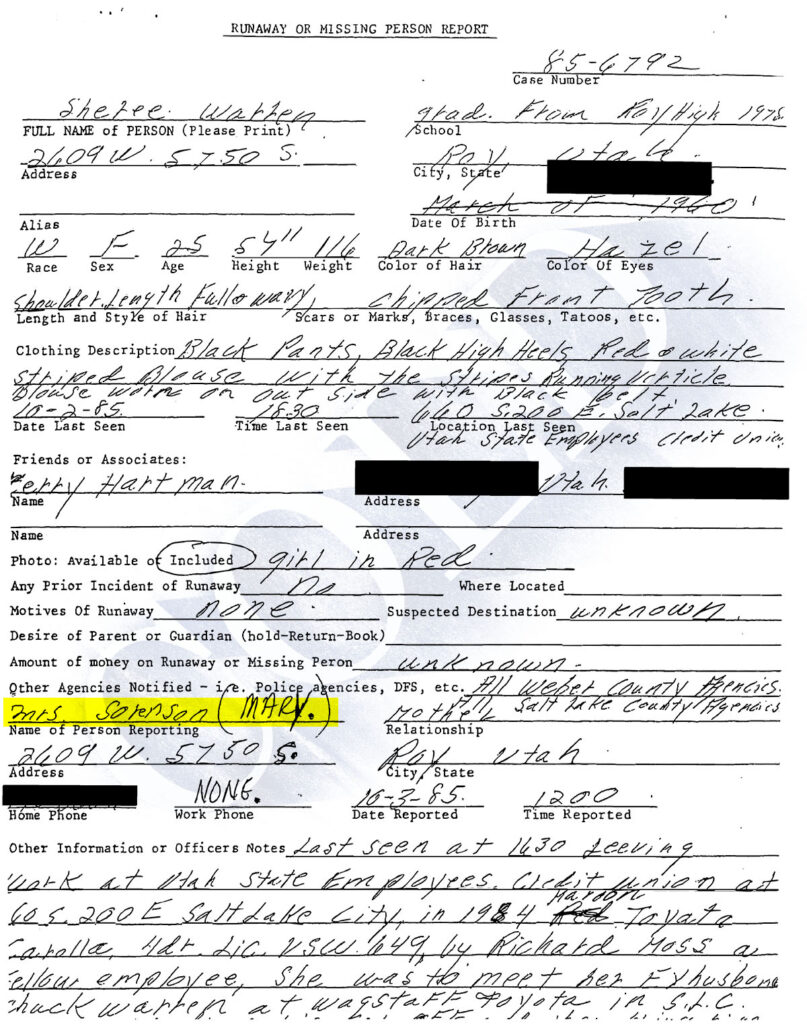
Shane Minor: I think this is a redundant question I wrote down. I think you already answered it because I asked you if you did you have anything to do with Sheree’s death.
Cary Hartmann: Nuh-uh.
Shane Minor: Did you kill Sheree?
Cary Hartmann: No.
Shane Minor: Do you know where Sheree is now?
Cary Hartmann: I do not.
Shane Minor: Do you know if Sheree was placed in the area of Lost Creek?
Cary Hartmann: I don’t have a clue.
Shane Minor: Do you know if she was placed in an area above Causey Estates?
Cary Hartmann: No, I don’t have any idea.
Cary Hartmann interview: Rumors and innuendoes
Shane Minor: Now, before I asked you those questions, you said she heard some rumors about what was said. Tell me about that.
Cary Hartmann: Well, someone once said to me, to a girlfriend, “were you involved in her disappearance? Were you, were you arguing with her? Did you get rid of her?” I says “are you kidding?” I says “absolutely not. We were in love. We were gonna get married and never had one, not a one cross word.” That’s absolutely untrue. So that died off. That just died off.
Shane Minor: Ok, but there’s, somebody’s asking you about that?
Cary Hartmann: Yeah.
Shane Minor: And you say it was a girlfriend. Who was the girlfriend?
Cary Hartmann: That was Sheree’s, uh, umm, she worked at Weber State.
Shane Minor: A girlfriend of yours?
Cary Hartmann: Well, she was, she worked right next door in the building. So she was a girl friend. She worked in the landscape department. Uh, that I haven’t seen or heard from in 20 years (unintelligible). That was just a rumor—
Shane Minor: Not a date type of girlfriend.
Cary Hartmann: Oh no.
Shane Minor: But just a female friend, an acquaintance.
Cary Hartmann: She worked right next door so we, we knew the whole crew.
Shane Minor: Ok. What were some of the other rumors that you’ve heard?
Cary Hartmann: Well, uh, Steve Bartlett, my oldest friend on this Earth in Salt Lake, said to me once “what did you do with her body?” And I said “Steve,” I said “are you kidding me?” I said “has our friendship come to this?” I said “I did nothing, nothing with her in any way, shape or form. I know nothing about it.” I was shocked that he would say that.
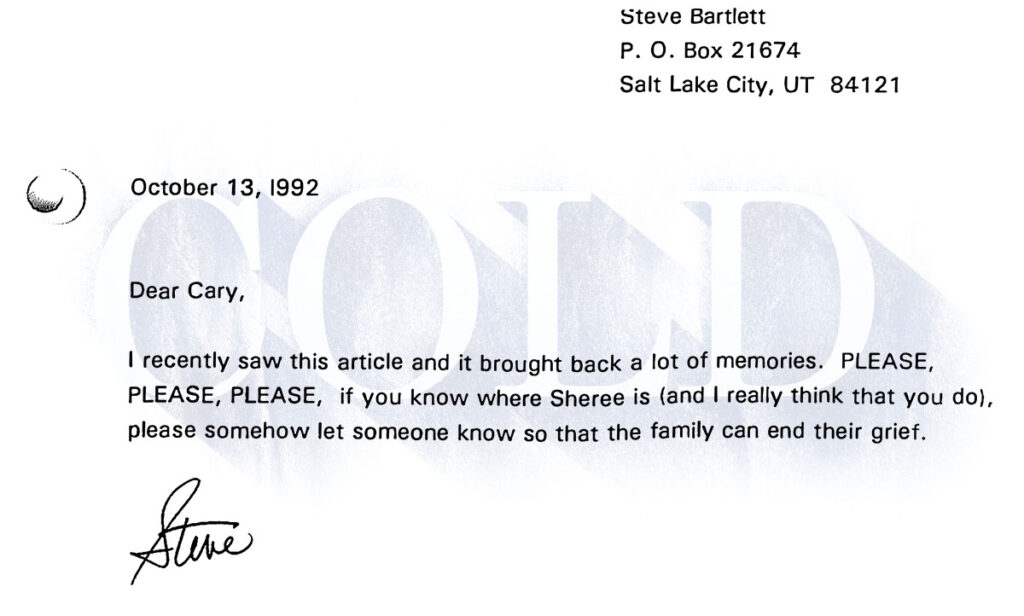
Mike Elliott: He asked you that directly, huh?
Cary Hartmann: In a letter, actually. We wrote back and forth—
Mike Elliott: Oh, ok.
Cary Hartmann: —‘cause we’ve known each other since we were kids. He was a, he was a special investigator, at least he was, for the district attorney’s office in Salt Lake.
Mike Elliott: Oh.
Cary Hartmann: (Unintelligible) He is a great guy.
Cary Hartmann interview: Shane Minor challenges Cary
Shane Minor: The reason I ask you this is because of people, there’s a couple of people that have said that you and her, put the two of you together after she left work.
Cary Hartmann: That’s absolutely, incredibly false. Ain’t no way on this planet. That is a lie, absolutely direct lie.
Shane Minor: There’s no way she could have come to Sebastians and talked to you? (Unintelligible)
Cary Hartmann: Let me tell you, let me tell you, Shane. Dave’s sitting there and the bar is filled with people, filled with people.
Shane Minor: Ok, but the reason I’m asking you because this is what’s been told to us.
Cary Hartmann: No.
Shane Minor: That’s why I’m asking you.
Cary Hartmann: No, that’s bull, that’s bull crap. And anyone that, that, that, I’m telling you the bar was full of people, and Dave would’ve said “hey, if you come down to the bar with us (unintelligible).” ‘Cause they knew me. I’d gone down a lot, too much. No, that’s absolutely untrue, that’s a downright lie. No way on this planet. The last time I saw her was when she left that morning.
Shane Minor: Left your house?
Cary Hartmann: Yep. Said “see you honey, I love you. Go to work. Have a good day. Bye, bye.” That was that. The last time I talked to her was about 4:30ish that afternoon when she called from her work—
Shane Minor: In Salt Lake—
Cary Hartmann: —and said I’m workin with this guy, and—
Shane Minor: —when she called your house—
Cary Hartmann: Yeah?
Shane Minor: —I mean, now everybody’s got cell phones, but I assume that when she called you on that day, it was to your house, your house phone.
Cary Hartmann: Right. And there, there’re records. And I remember them checking that out. “Oh yeah, she did. We remember her calling.” (Unintelligible) She walked out—I’m sure you know this—she walked out of the credit union with this dude and uh, he says “do you want me to walk you to your car” or something. “No, I’m ok.” And he eyeballed her as she walked away, and she walked over to her car, and he walked over to his. She was going to go down to Wasatch Toyota and take her car and pick up, her ex-husband was coming from Ogden, if I have this correct, and he was going to bring Adam. And then she was goin to pick up her ex ’cause he was going to drop off that Supra—
Mike Elliott: Oh, ok.
Cary Hartmann: —for servicing, and she was going to pick him up and drive them back and drop him off and then take Adam. That, I think that was the plan. Well, the dude never made it. He didn’t show up.
Mike Elliott: Oh, at Wagstaff?
Cary Hartmann: Yeah. And this was what Wag, Wasatch or Wagstaff? It’s down the street on the right. Big old, grand old place. Because I went down there later with my boys and talked to every salesman and person in that place. I think they said “we never saw her or her car come in.” Because she was the, she was the kind of gal that would go in and bop in and say “hey, have you seen my husband or a black Supra and a little boy, a cute little boy. I’m the mom, I’m waiting for them.” That’s the kind of gal she was. She wouldn’t park out front and just wait to look. She’d make herself known, walk right in and talk to them. They told us, the police first of course, that they never saw her car. So, I went down days later, weeks later, took my boys and went into the dealership and said “have you seen a black Supra? Have you seen this guy? Have you seen this gal?” I had her picture. And “nope, haven’t seen (unintelligible). Didn’t see it on the night of.” “The night of, was she in here, did she stop?” What’s his face, dude had a, an appointment to bring it in. “Oh yeah, yeah. He never did show, never did show.”
Shane Minor: Hmm.
Cary Hartmann: I just thought that was odd.
Cary Hartmann interview: Causey Estates
Shane Minor: This is hunting season and are you a hunter?
Cary Hartmann: Yeah, oh sure.
Shane Minor: Did you do any hunting that year?
Cary Hartmann: Uh, I, I think I did. I went out most, most hunting seasons.
Shane Minor: Do you know when you would’ve gone out hunting?
Cary Hartmann: Well, it would have been opening morning. Generally it’s the third week in October so probably here. (Points to calendar)

Shane Minor: Were you in the area of Causey Estates, up above Causey Estates, the weekend after—
Cary Hartmann: No.
Shane Minor: —she turned up missing?
Cary Hartmann: Never, absolutely not.
Shane Minor: And I’m talking, when I say Causey Estates, there’s a road—
Cary Hartmann: Oh, I know where it’s at.
Shane Minor: —that goes up, and it goes up on top and it kind of borders that Deseret Land and Livestock up on top and I’m talking about on top of there, that you have access to—
Cary Hartmann: Y’know, you can’t get in there through the gate unless you’ve got a key. I never ever, ever in my life went to Causey when I didn’t go through the gate that Dave [Moore] didn’t open it, never.
Shane Minor: Did you ever have a key to Causey?
Cary Hartmann: Oh, no, never.
Shane Minor: Did you borrow a key from anybody?
Cary Hartmann: Never, never, never.
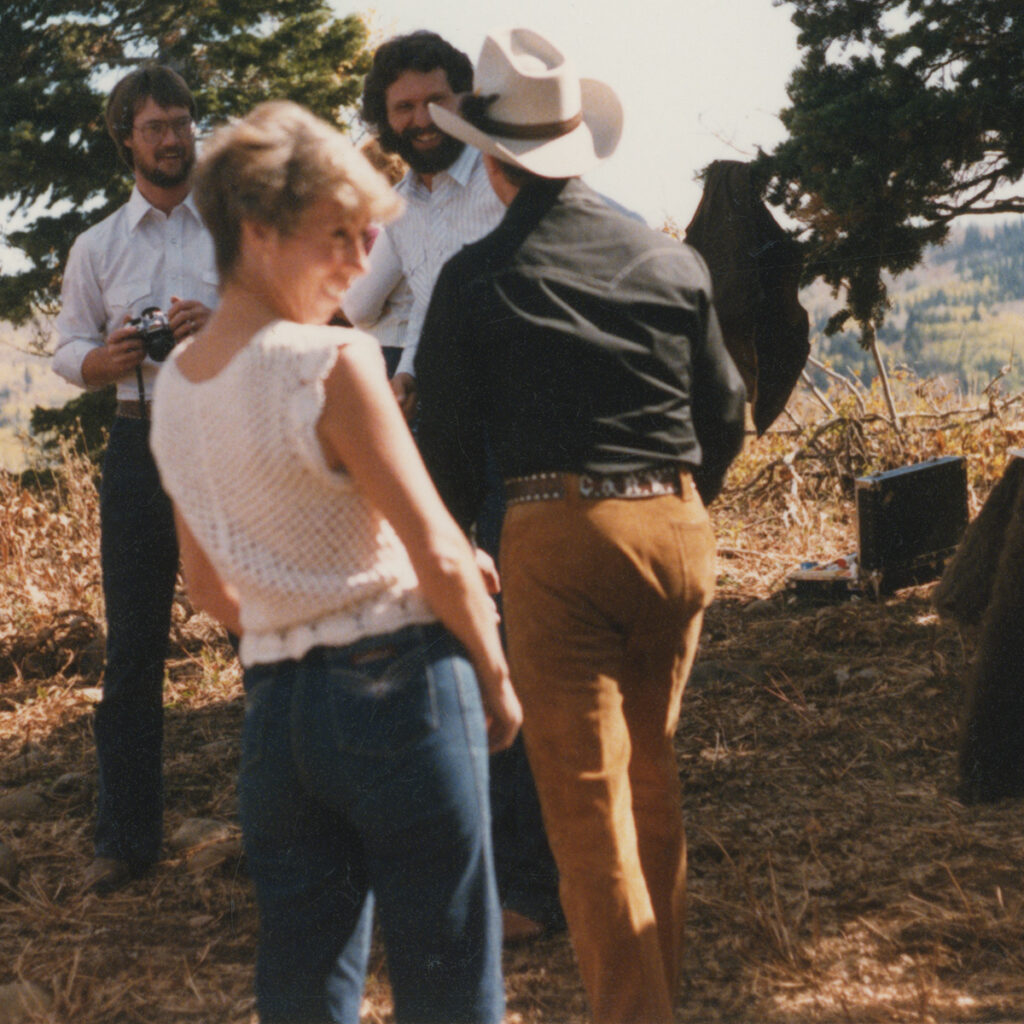
Shane Minor: So, Dave [Moore] had a key to Causey and that’s how you—
Cary Hartmann: Well sure. He had property. And I hunted at Lost Creek. I never hunted at Causey, ever. And I hunted with my brother. And we always put our truck and our camping site right there in the cul-de-sac. People all over the place.
Cary Hartmann interview: Hunting at Lost Creek
Shane Minor: Which cul-de-sac? I’m not very familiar with it.
Cary Hartmann: Right at, by the boat ramp. There’s only one. You get on the road, there’s only one that’s paved, there’s only one that I know of—
Shane Minor: Where is it?
Cary Hartmann: By the boat ramp.
Shane Minor: At Lost Creek?
Cary Hartmann: Yeah.
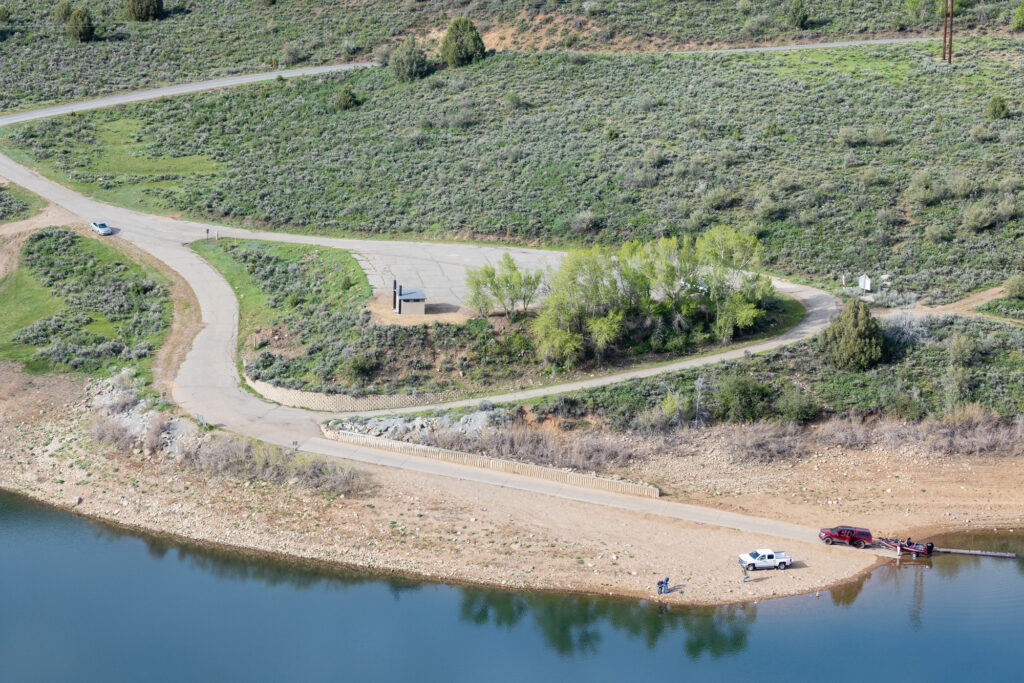
Shane Minor: And that’s where you guys were camping, that’s where you hunt—
Cary Hartmann: Yep.
Shane Minor: —that area?
Cary Hartmann: Yep, yes.
Shane Minor: And what’s your brother’s name, which brother?
Cary Hartmann: Jack.
Shane Minor: How many, you got more than one? Did the two of you ever go up and hunt that area up above Causey?
Cary Hartmann: Never. Never. I’ve never hunted it with Jack. He might have hunted it. But I’ve never hunted it. Number one, it’s private and two I couldn’t get through the gate.
Shane Minor: But you’ve been up in that Causey area with Dave Moore before?
Cary Hartmann: Yeah, Dave [Moore] and Thorsted and all those guys.
Shane Minor: Pardon me?
Cary Hartmann: Dave and Thorsted, Bill Thorsted and all those guys. In the winter time on our three-wheelers, mostly. Dead of winter, cruising around up there.
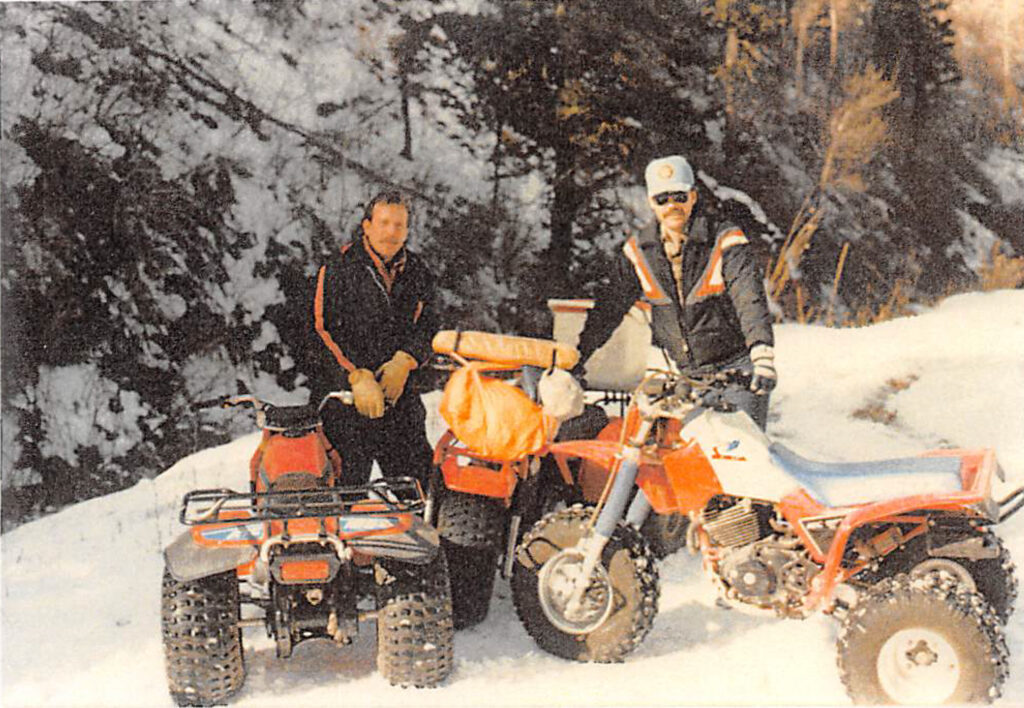
Shane Minor: Dave and Bill Thorsted?
Cary Hartmann: Mmhmm.
Mike Elliott: Why does that name sound familiar? Bill Thorsted?
Cary Hartmann: He was a SWAT team officer. He was a cop for a while.
Mike Elliott: Oh, was he? Ok.
Cary Hartmann: He worked for NAPA last time I heard.
Mike Elliott: (Unintelligible) sounded familiar.
Shane Minor: And you’ve never been up in that Causey area with your brother?
Cary Hartmann: No, never.
Cary Hartmann interview: The inmate informants
Shane Minor: Have you ever talked about this to anybody you’ve been locked up with? Because there’s been some people that have given statements that would indicate on the statements that they’d give that you talked about what happened to Sheree.
Cary Hartmann: I think I’ve probably mentioned it to a few. It’s not a secret.
Shane Minor: But, but what they’re saying is that you were responsible for her. That’s what, that’s—
Cary Hartmann: That’s bullshit.
Shane Minor: —these people told law enforcement.
Cary Hartmann: That’s bullshit. That’s a, that’s a inmate with a grudge of some sort.
Shane Minor: Do you know who that would have been?
Cary Hartmann: I don’t have a clue. Being an ex-cop in prison would tend to make not everyone your friend.
Shane Minor: I understand. I understand. But, uh—
Cary Hartmann: But that’s absolutely bullshit.
Shane Minor: —but I’m not, but that, that has happened, ok?
Cary Hartmann: That’s bull crap.
Shane Minor: Ok. Over the years that has happened two or three times with a couple of different individuals.
Cary Hartmann: That’s somebody, somebody looking to gain—
Shane Minor: But if it’s somebody you’ve had a problem with, then, then who would that be? Who do you think you would have been that you had a problem with?
Cary Hartmann: I don’t know.
Shane Minor: ‘Cause I can tell you right now: one person called the FBI, and they made several calls to the FBI. And that’s what was, that was the context of their conversations was, uh, about your involvement with this. I mean, that’s one of the reasons why I wanted to, to talk to you.
Cary Hartmann: I can tell you this being, having been down so long. It’s someone looking for something to gain, favoritism, a break on their sentence, somebody with a grudge, somebody who’s pissed off, somebody who hates cops, somebody who doesn’t like me, somebody who doesn’t like the way I look or my face or—
Shane Minor: Ok. But can you—
Cary Hartmann: —and it’s absolutely wrong—
Shane Minor: —do you know who you’ve had problems with?
Cary Hartmann: Yeah, probably one: Eddie Monteiro.
Shane Minor: And who is he?
Cary Hartmann: He’s just a punk in, uh, Iron County, uh, looking to make a name for himself, looking, I think he told me he was sent in by someone to be an informant.
Shane Minor: Do know you anything, do you remember anything about him? Where he was from or what his charge was, what he was doing time?
Cary Hartmann: Everything he told me was false and fake and bull crap. But I, regardless of him as a person, I never, ever, ever, ever, ever said I had any involvement with her disappearance because I don’t, I didn’t, absolutely no way under the sun, no way have I had anything to do with Sheree’s disappearance. So what he said, I don’t care if he said it to the FBI or—
Shane Minor: I’m just telling you that’s—
Cary Hartmann: —well—
Shane Minor: —‘cause there’s some reports that I have read that a person called and that, those exist. ’Kay, I’m not making that up. I’m not—
Cary Hartmann: Well I—
Shane Minor: —I’m not trying to tell you something.
Cary Hartmann: (Unintelligible)
Shane Minor: But I have read that. That’s what led to the questions that I wanted to ask you.
Cary Hartmann: Sure, I, I just wanted to be absolutely clear on that fact, ten times. No way on this Earth did I tell anyone that I was involved with because I’m not. So it’s a, like I said, it’s an inmate looking to feather his nest, get a break on his sentence. Eddie Monteiro, later, later got a—he said he was in on car theft but I know that was a lie because most of what he told me it was a lie—later he was the inmate that was caught threatening to drive a tanker full of fuel into the Board of Pardons building. And he from there went to max. He got out and got himself in trouble, I remember him doing it, he got out and got himself in big trouble. And uh, the last I heard he was cooling his heels in max.
Shane Minor: Hmm. How long ago would that have been? I mean—
Cary Hartmann: Oh, good question. Ten years.
Shane Minor: Ok.
Cary Hartmann interview: A hard time for Cary
Cary Hartmann: Other than that, I can’t think of anyone with a hard enough grudge. Shane, when I come in this system it was, I’m not going to whine to you or cry about it, but—
Shane Minor: It would‘ve had to’ve been hard for you.
Cary Hartmann: You have no idea. You have no idea. I’m, I’m safe here.
Mike Elliott: Down in this, down here in Monticello? A little better than the others?
Shane Minor: Did you ever have any detailed conversations with anyone about Sheree?
Cary Hartmann: Eddie Monteiro.
Shane Minor: I mean, that’s a personal, that was your personal relationship and I would imagine what you just described to me, you’re not, and I’ve never heard about you, you kept your distance away from other inmates and you don’t really associate that much with them.
Cary Hartmann: I try, I’m very focused. I try and do my time and leave people alone, stay out of their face and do my own thing. Keep my mouth shut.
Shane Minor: Sure. But Eddie Montero is the only person you can think of you’ve had conversations with.
Cary Hartmann: Right, right. Working—
Shane Minor: And what would have the context of the conversation have been?
Cary Hartmann: Oh, I can’t (laughs) remember. He’s the only one that I can think of that, at that time and later on, struck me to be vindictive enough to do something like that. If there’s someone else that come out of the woodwork and there’s plenty (unintelligible). I’ve tried really hard to change my life and to demonstrate the fact that I know that I made huge, huge, giant mistakes in my life, hurt a lot of people, caused pain, agony and grief to my victims and their families, (crying) my family.
Shane Minor: Oh, I would think it would be, it’s been very hard for them, along with you.
Cary Hartmann interview: Chasing therapy
Cary Hartmann: It’s killing my folks.
Mike Elliott: Do they still live up in the Ogden area or?
Cary Hartmann: They’re real supportive and they’re wonderful. They’re both 80. I’ve got a good support system and I’ve made changes in my life and I’ve demonstrated that I’ve made changes in my life.
Shane Minor: And that’s one of the things that Mr. Jones indicated to me when I talked to him on the telephone.
Cary Hartmann: And I wanted to tell you that down here, I come down, I chased therapy around three or four different places. When I get in that, in therapy, it gets sent to Purgatory. Then I go to Purgatory, and, and uh, therapy gets sent to Duchesne. So I go to Duchesne and therapy goes back to the prison. And then they literally take the program out and sent it.
Shane Minor: So your therapy is, the structure’s so that it’s at this place and you can be over here, so then if you go over here then the therapy changes? Is that why you’re—
Cary Hartmann: No.
Mike Elliott: You’ve got to get moved with the therapy.
Cary Hartmann: If you want therapy, you’ve got to go where the therapy is.
Shane Minor: Oh.
Cary Hartmann: It’s only in two places, here and Draper [at the Utah State Prison].
Mike Elliott: Huh.
Cary Hartmann: And I, got me an IPP [Inmate Placement Program] and they got me out of Draper for a reason. So I come down here to get my therapy done. It’s important to me to finish therapy, learn and discover the things that I can do to stop the fantasy buildup, and the things, the thought processes in my head, in my heart to cause me to do what I’m doing. I know that. So I come down here to get therapy, to get it done and to be involved in the therapy program. To go to college, to go therapy and be in a population down, this is the cream of the crop.
Shane Minor: Ok.
Cary Hartmann: This is not the knuckleheads. I’m safe back here, I don’t have to worry about watching my back every five minutes. So I want to stay here. I want to be left alone here. And, and that’s, that’s what I’m doing.
Cary Hartmann interview: A new kind of lie detector
Shane Minor: Ok. Uh, I don’t know how you feel about this but from our position, taking this old case, it’s 20 years old now. Believe me, this isn’t the only case that it’s impossible resurrecting and trying to make headway. With the changes in the police departments and I know you’ve been incarcerated for, what 18 years now or something like that? I’m sure there’s been a lot of changes since what you remember. Umm, things have gotten lost so we have to take, we have to take it from the beginning and rebuild everything.
Cary Hartmann: I was kinda won, kinda wondering why you had to rebuild all this when they have all of this—
Shane Minor: It’s taken me a couple a, it’s taken me a couple of years of tracking some people down and trying to, what you pointed out, verify and corroborate things that have been said. Uh, that’s one of the reasons why when I got a call that said you were willing to talk to us, it was worth the drive down here just to see. Just because no one, these questions have never been asked and there have been no answer to them. There’s, there’s a new thing out there. I don’t know how you feel about it. I can imagine how you can feel about it because of your situation, but I’m going to ask anyway. Uh, it’s not a polygraph, it’s called a voice stress analysis. Have you heard of that or anything about that?
Cary Hartmann: No.
Shane Minor: It’s a test they run. It’s not, I don’t think it’s a very, nothing is an exact science or conclusive, but it’s just an indicator. It works on the same concept of polygraph except for it’s based off of your voice. How would feel about doing something like that as a process of elimination?
Cary Hartmann: I don’t care. I told Jack Bell I’d volun, I’d volunteer for a polygraph.
Shane Minor: This isn’t, uh, it’s not a polygraph and it’s based—
Cary Hartmann: How accurate is it?
Shane Minor: —it’s based off your verbal (unintelligible).
Cary Hartmann: How accurate is it? I don’t know anything about it.
Shane Minor: It’s fairly new, and I can’t answer that other than what I’ve been told. There’s a couple of people I know that have gotten certified. It’s pretty intensive for them to certify on it. You go through, they ask you a series of questions, uh, nothing more than what we’ve already talked about. There’s no secrets or I’m not hiding anything, y’know, or trying to surprise you with anything. I just don’t understand completely how it works other than it’s one of the things that they use these days, and I asked about that, and the kind of questions you’ll be asked will be the same questions that we’ve already talked about, and all it is an indicator.
Cary Hartmann: Hmm.
Shane Minor: And while you’re here I thought we could ask you about it. It’s up to you.
Cary Hartmann: Yeah, I don’t have any problems with any of that stuff.
Shane Minor: If you would do that, I might look in to setting that up. Again, as part of, it would help us in the process of elimination.
Cary Hartmann interview: Eliminating Cary as a suspect
Cary Hartmann: You mean after all this time, me being in Ogden, and her being in Salt Lake City, 40 miles away, at the same exact time, and my whereabouts have been verified that whole time, it doesn’t eliminate me?
Shane Minor: It, it does except for, Cary, one of the things that have happened since you were arrested and, that’s information that came that can’t be accounted for conclusively. That’s, that’s—
Cary Hartmann: My position exactly. How can you verify the source of information?
Shane Minor: —and that’s, and that’s what has led us to this. It’s just one way or the other to do something with it or just shit-can it and move on to the next.
Cary Hartmann: You’ve got to see my position.
Shane Minor: I understand your position.
Cary Hartmann: I mean, I’m dubious as hell about—
Shane Minor: I understand.
Cary Hartmann: —this or whatever, thinking “oh man, what do I have to do?”
Shane Minor: I understand, that’s why I’m asking.
Cary Hartmann: So—
Shane Minor: If you want, I can leave you my name and address, if you want to write me, tell me to shove it or whatever, you can do that. If you want to think about it, that’s fine. All I’m telling you is I’m laying it on the table right now for you—
Cary Hartmann: Well I—
Shane Minor: —and the reason that, that we’re down here is because of that information that came in, that had that been known or come up in 1985, you probably would’ve been asked about it at the time. It would have been taken care of. It would have been resolved at that time. But because it come years later, you see the predicament that I’m in, picking this thing up, uh oh, I think it was 15, 16 years after the fact when I started looking into it, just trying to find police reports and, and find the other stuff. Y’know, the documentation of her car being found in Las Vegas, trying to find all that stuff and put it together so that all that information is in one place which has taken me some time. So that’s, that’s the why. Had it been known at the time, it would’ve, I guarantee you, most likely been asked. A lot of these—
Cary Hartmann: And I would probably have given you the same answer then that I give you now.
Shane Minor: —I mean, I don’t know—
Cary Hartmann: —and I didn’t contact—
Shane Minor: —I didn’t talk to you back then, and I didn’t know you back then, y’know, so I don’t know exactly what was said. You talked to Jack Bell, you worked with Jack Bell a lot, and there was some of, a little bit of a report, a missing persons report, and that’s about all. So there was a lot of information that, that we’re just trying to put together.
Cary Hartmann: Yeah. I can understand that.
Cary Hartmann interview: Sheree Warren’s family
Shane Minor: Just out of fairness for her and out of fairness for her family.
Cary Hartmann: I can only imagine what her folks go through every time there’s a missing person, every time there’s someone found, or found as a hint, it just kills me.
Shane Minor: Yeah, and I’ll tell you when I talk to them, I re-contacted them and started this that was a very hard thing for me to do because how do you, how do you approach an older couple like that? They’re just like your parents. They’re getting—
Cary Hartmann: They’re the sweetest people.
Shane Minor: —older, and they’ve got a daughter that doesn’t, uh, and all they want to do is, is put closure to it. And the only way to do that is whatever remains there is if they can ever recover that. That’s the only way they’re ever gonna be able to obtain closure or, y’know, they’ll just take it to the grave. And that was very hard for me to talk about with them—
Cary Hartmann: I hate that, hate that. I just love them to death.
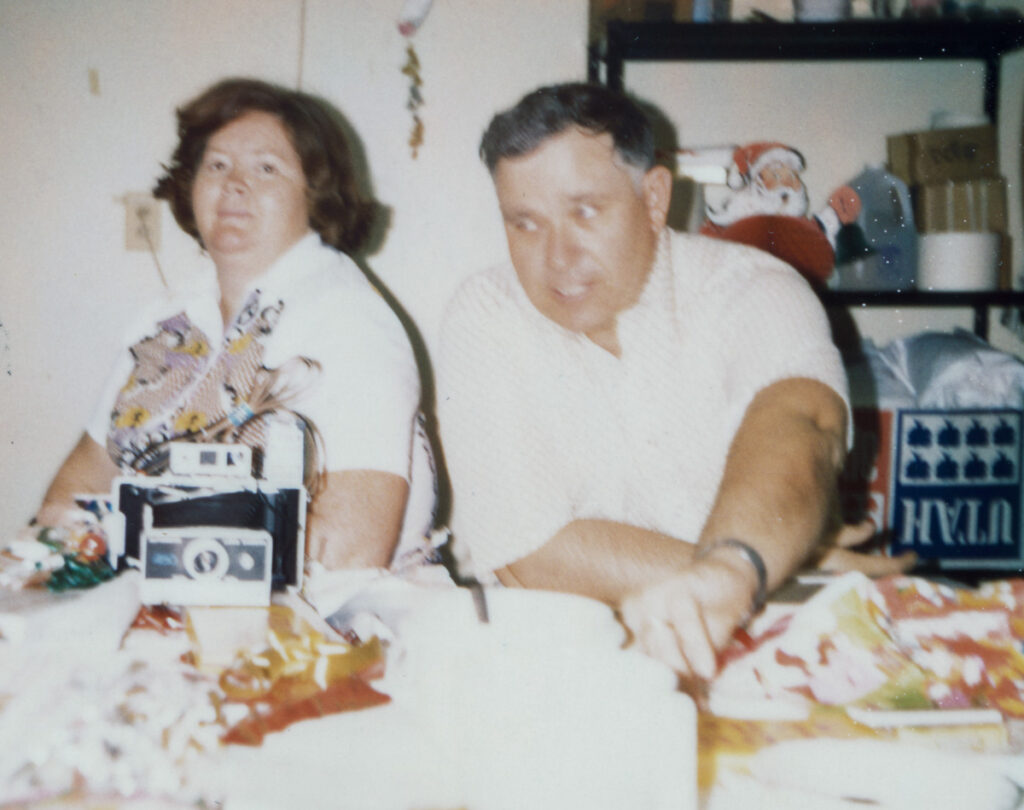
Mike Elliott: I think there’s a lot of people that it stays with. One, the two, uh, y’know, ladies that lived upstairs of you. They still remember her, y’know, and remember her coming there that week and stuff. And, y’know, uh, they still remember about her.
Cary Hartmann: It’s the saddest story, it is just a heartbreak.
Shane Minor: Is it, I’ll try to set that up, like I said, it’s just to try and narrow out some of these questions to get an idea so we can move on.
Cary Hartmann: Uh, give me your name and address and stuff in case I change my mind or have a change of heart.
Hear what happened when investigators questioned Cary Hartmann’s brother in Cold season 3, episode 8: Fool Me Once
Episode credits
Research, writing and hosting: Dave Cawley
Audio production: Ben Kuebrich
Audio mixing: Ben Kuebrich
Cold main score composition: Michael Bahnmiller
Additional scoring: Allison Leyton-Brown
KSL executive producer: Sheryl Worsley
Workhouse Media executive producers: Paul Anderson, Nick Panella, Andrew Greenwood
Amazon Music and Wondery team: Morgan Jones, Candace Manriquez Wrenn, Clare Chambers, Lizzie Bassett, Kale Bittner, Alison Ver Meulen
KSL companion story: https://ksltv.com/527283/cold-the-untold-story-of-the-search-for-sheree-warrens-remains-part-2/
Episode transcript: https://thecoldpodcast.com/season-3-transcript/fool-me-once-full-transcript/








